Best Back to School Ideas 🍏
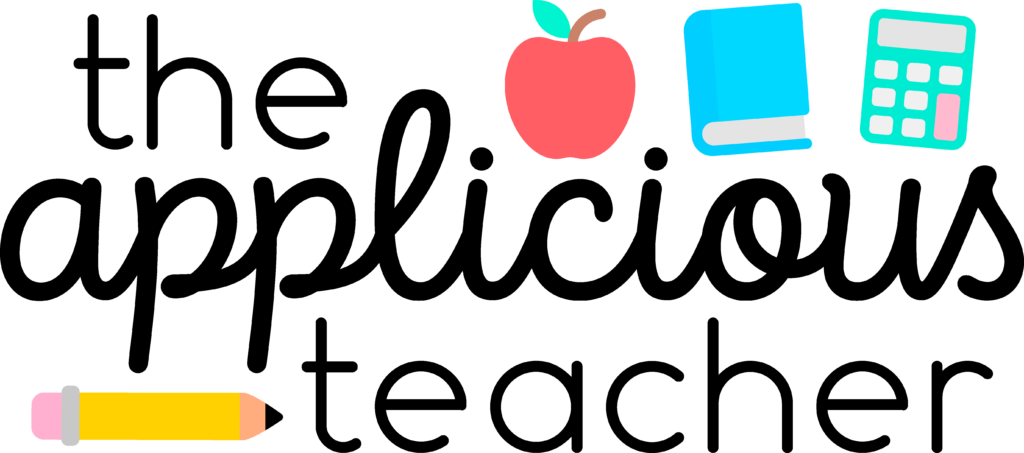

End the Unfinished Work Battle: Catch-Ups and Pickles
Share this post:.

Are your students struggling to complete their work? Up to your eyeballs in missing or unfinished work assignments? Then you might need to institute a “Catch-up and Pickles” routine in your classroom as a way to win the missing or incomplete work battle! This is seriously my favorite unfinished work routine!

A few weeks ago, I posted a Reel on Instagram about some of my more “controversial ” grading practices. Between you and me… they really aren’t that controversial… just good teaching! But folks LOST THEIR MINDS! And honestly, it shed light on a bigger problem: the struggle of incomplete work.
Controversial Grading Practices
You’re probably wondering what those controversial grading practices were. I’ll let you watch the IG Reel to see all three, but the one that had most teachers up in arms was the belief of not putting anything less than 50% in the grade book.
This one line led to me being called many things, but most teachers asked, “What about missing or incomplete work?”
To which I responded that I rarely struggled with incomplete or missing work. I can think of one time I had to put a zero in the grade book because of a missing assignment – ONCE – in 13 years of teaching. Those are some pretty good odds!

Unfinished Work Routine
So, how can this be?
First, let’s clear up some things:
- No – I didn’t have perfect students who completed every assignment without asking.
- No – I didn’t work at fancy schools with high volumes of parents involved who made sure the work was completed at home.
- And, no – I didn’t work myself to death chasing down students.
I rarely had missing or incomplete work because I planned time in my week for students to work on missing or incomplete assignments.
Today, I’m sharing this simple yet HIGHLY effective routine that basically eliminated the struggle to get students to complete missing or incomplete assignments.
This magical weekly routine that solves the missing work problem is fondly called, “ Catch-up and Pickles. ” But, that’s really just a fancy name for a time set aside on a Friday morning so students can work on unfinished work.
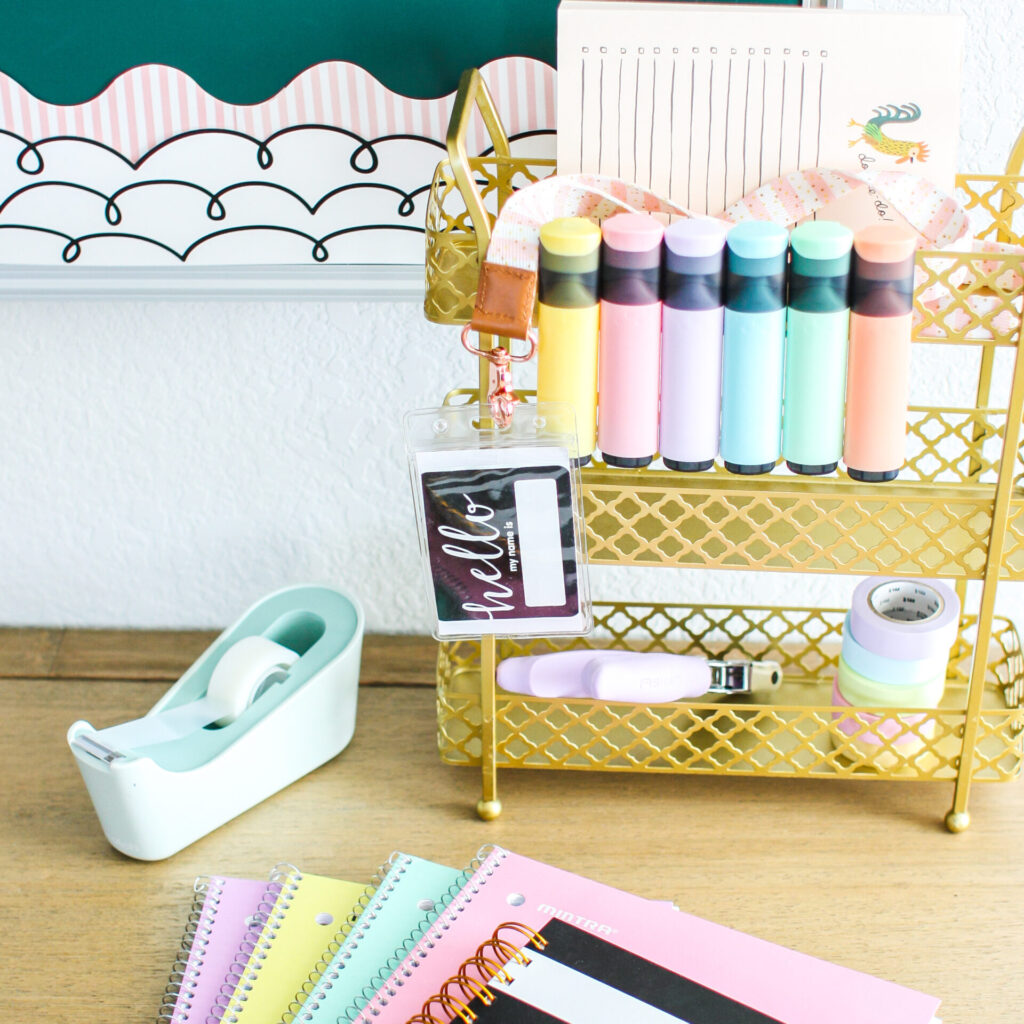
What is Catch-Up and Pickles?
I shared about this concept a while ago in my “Small Group Time Exposed” post , but I feel like after all the hoopla that Reel caused, it warranted its own place on the blog!
Each day, I had 60 minutes of time built into my schedule for small group rotations. That worked great Monday through Thursday. But, I noticed that Fridays were a bit cramped. Not only did we have our spelling and vocabulary test that day but we would also have a reading comprehension assessment. Time is needed to complete all these assessments, and that ate into a portion of our small group time.
Rather than try and stuff the small group instruction into the 30 minutes that were left after completing everything else, I decided to transform that awkward time slot into productive work time.
So at the end of the week, instead of formal center rotations, I did a “Catch-Ups and Pickles” routine. Students who had not finished their work used this time to “Catch-Up,” while those who were done were allowed to “Pickles” a reading-based activity to complete.
For students, this time was dedicated to completing their work or choosing a preferred activity to complete.
For the teacher, this routine provided time to reteach lessons, pull students for assessments , or conference with students one on one.
And let me just say… this was a wildly popular time in my classroom!
How to Find Time?
So the big question here is, how do you find the time? Everything you are required to teach in a day leaves very little time in your schedule for “makeup work,” but like I shared before… I was able to find time by reallocating the time I was using for reading centers. It wasn’t working for us on Fridays, so we changed it up.
I suggest you take a look at your schedule. Do you have some awkward or weird times?
I like the idea of doing Catch-up and Pickles on a Friday, so it’s easier to track the work that needs to be completed. But maybe Fridays don’t work for you. Look for a block of time (at least 20 mins!) and see if it works. If it doesn’t, restructure or choose a different time. This could even be something you do at the end of a unit in reading or math or on the last school day of the month.
Warning: I wouldn’t do this one day a quarter… that’s too big a chunk of time to complete everything. Doing that is like saving all your laundry for a month and trying to do it all in one day. Someone will get overwhelmed, and it’s not going to get done.
How to Get Started with Catch Up and Pickles
Once you’ve found your time, it’s time to plan the “Catch-Up and Pickles” activities.
In my classroom, I allowed students to “catch up” on any work, whether it be math, reading, or something else entirely. You need to select what students will be working on. Maybe it’s just reading, so you do only reading makeup work.
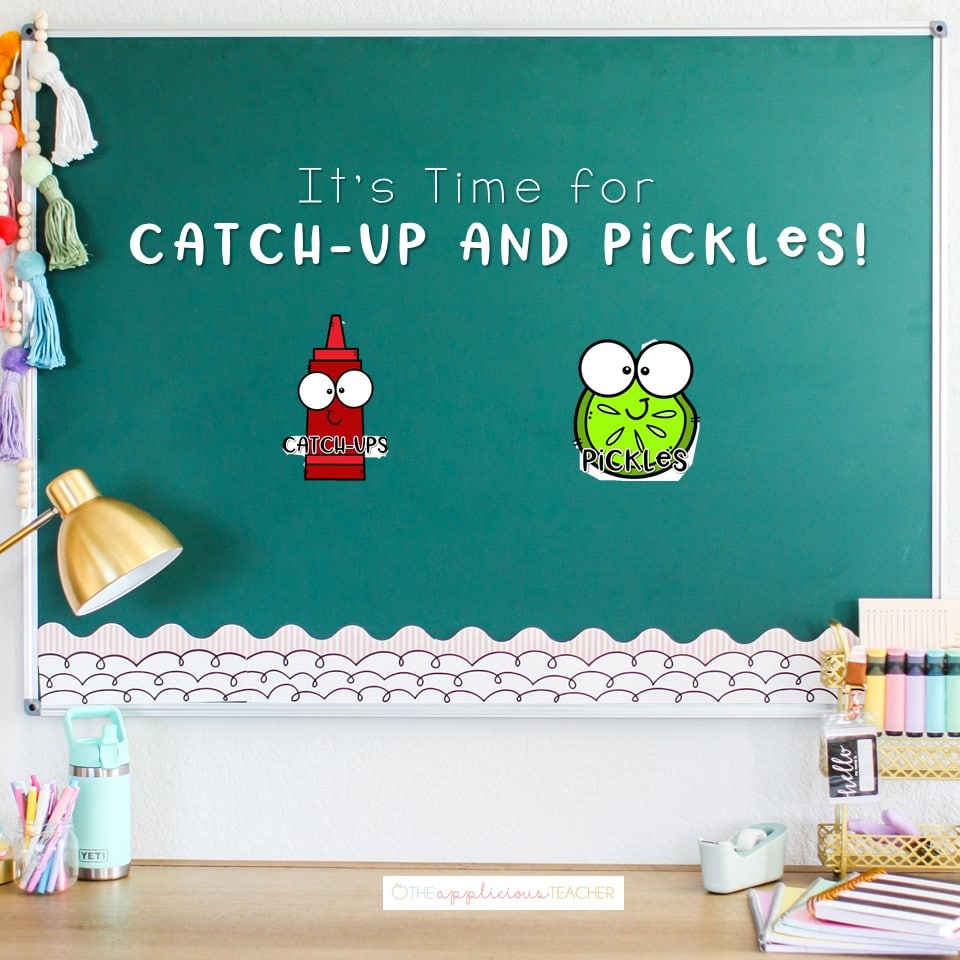
Whatever you decide, be specific. The unstructured nature of this routine means that chaos could happen at any minute. Being clear on what students should be working on at this time (and reinforcing it each time you have a Catch-up and Pickles session) can help keep the crazies at bay.
Who is a Catch-Up and Who is a Pickle?
From there, you’ll need a system for knowing who is a “catch-up” and who is a “pickle.”
Right before we started, I’d scan my grade book for any missing assignments. Those students with missing work would go on my “catch up” list.
Another way I identified students was through their “Unfinished Work” folder. Any classwork that didn’t get completed went in there (not tests or quizzes, just classwork). Right before we’d begin, students would pull out their folders and check to make sure there wasn’t any work that needed to be completed. If there was, they were on the “catch-up” list.
Let me just say, just even having an “Unfinished Work” folder helped a great deal with handling incomplete work! It was much easier for students to keep track of their work. If they finished an assignment early, they could either grab a book to read or work on unfinished work from their folder. The finished work folder lived in their desk, and I always told them, “If you aren’t done, put it in your finished work folder!”
You can read more about the unfinished work folder here !
I kept this routine real simple, guys! No fancy slide shows…just a whiteboard and names. In one column, I’d write “catch-up” with the students’ names and a list of work they needed to complete. In the other column, I’d write “Pickles” with the names of students who had completed all their work. When a student completed assignments and turned them in, they could erase their name and put it under the “pickles” side instead.
Activity Idea for Pickles
Now, remember, the name of any student who had completed all their work or their I-Ready minutes would be placed in the Pickles column.
My students loved being a pickle! They loved the idea of choosing their own activities (even if they were reading-based).
Some activities my students could pick from:
- Writing and illustrating stories – Pretty popular! Especially the illustrating. I showed students how to make a mini-book with lined paper folded and stapled together.
- Playing an educational computer game – Probably the most popular!
- Creating or playing on the IPad – Don’t worry, I was very clear about which apps they could use during this time!
- Completing a reading center game – Students could do this with their friends. I’d put any stations we had completed that week in an area towards the back of the classroom, and students could grab one to play. This also worked well for any student who needed to complete a station activity for their “catch-up” activity. Need reading center ideas? These were always a hit !
- Free choice reading – They could choose their own book and where they’d like to sit and read. They could also read with a buddy.
- Helping a friend complete their work – This one was pretty popular! I allowed it as long as they weren’t just telling their buddies the answers. Honestly, it was a win-win: The student got help, and the student helping was learning more! Bonus- it freed me up to complete DRAs, fluency checks, or reteach skills as needed.
- Teacher assistant – Sometimes I needed help, so if they were done and didn’t want to do one of the other activities, I’d put them to work, helping to organize papers or filling the mailboxes with returned work.
Unfinished Work Routine- Catch-up and Pickles
So there you have it, teacher friends. This is the simple, routine way I kept my students on top of their work. I mean, what teacher wants to feel like they are constantly chasing students around trying to get them to finish their work? NOT ME! Now you don’t have to!
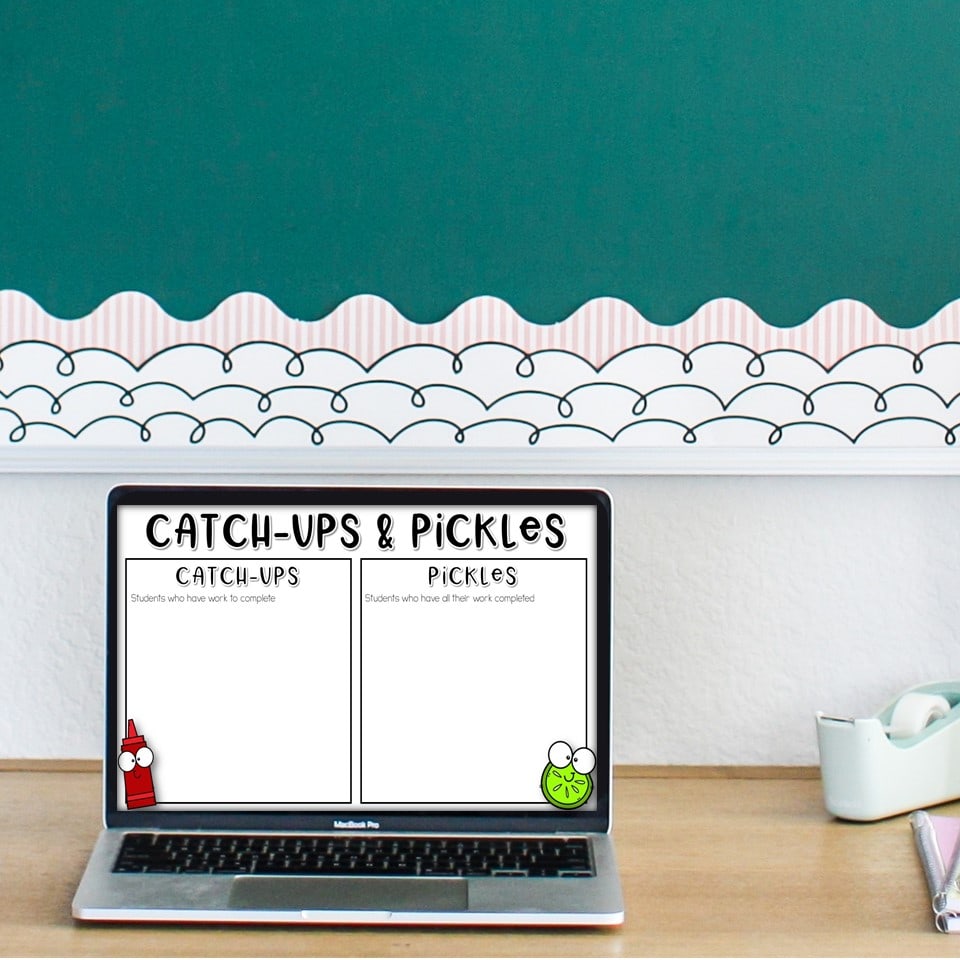
Free Catch Up and Pickles Download
Want to grab a few resources to help you get started? Click below and have this resource sent straight to your inbox! Now you can easily implement a Catch-up and Pickles routine in your classroom this week! This free download includes printable tracking sheets, whiteboard labels, and an editable PowerPoint file.

More Great Ideas!
Check out these other great ideas to try in your classroom!
- 5 Tips for Dealing with a Chatty Class
- How to Organize Your Google Classroom for 2nd Grade
- Help Students Take Ownership of Their Learning without a Data Notebook
- End of the Year Survival Tips
- Categories: Classroom , Classroom management

Hi, I'm Leigh.
The Applicious Teacher is all about creating hands-on and engaging lessons that align with the standards while still having time for your life. This is your place for ideas, tips, and resources for the REAL teacher!
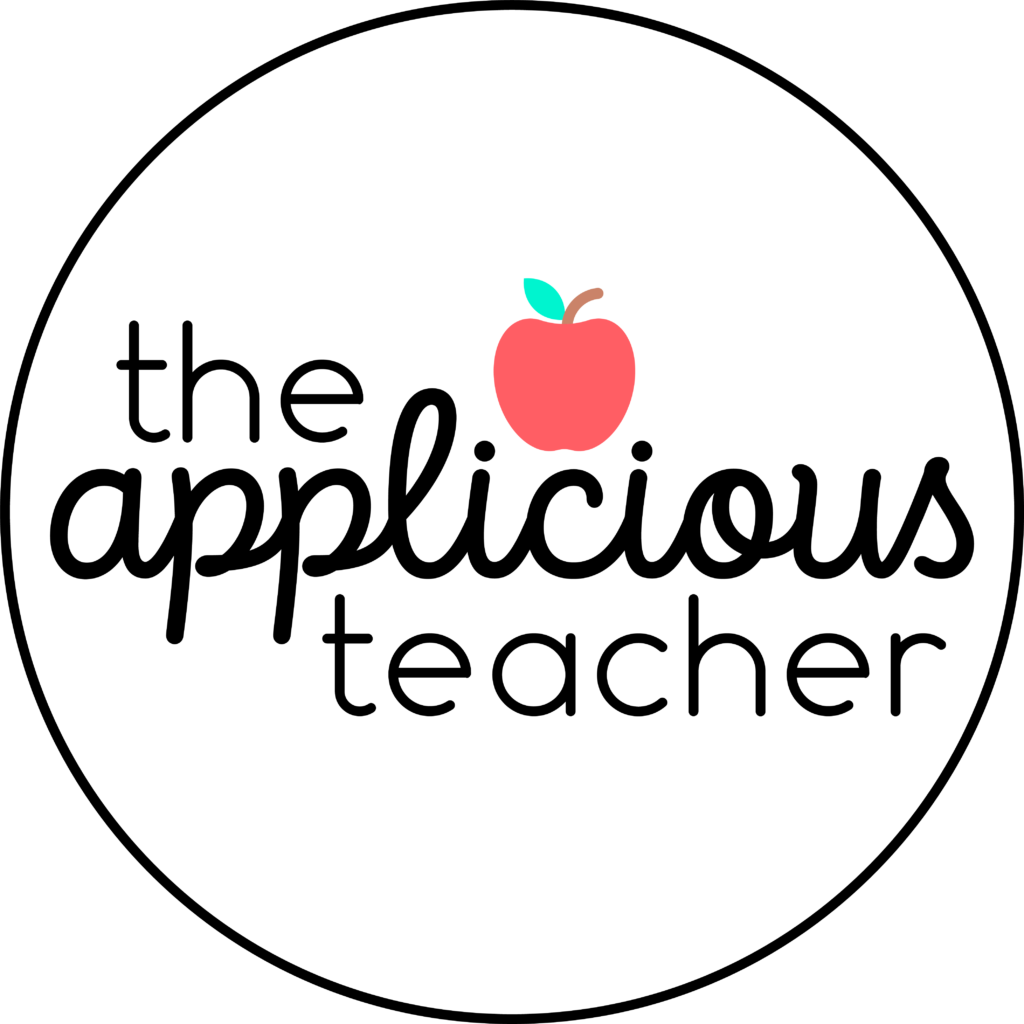
Recent Posts

Popular in the Store
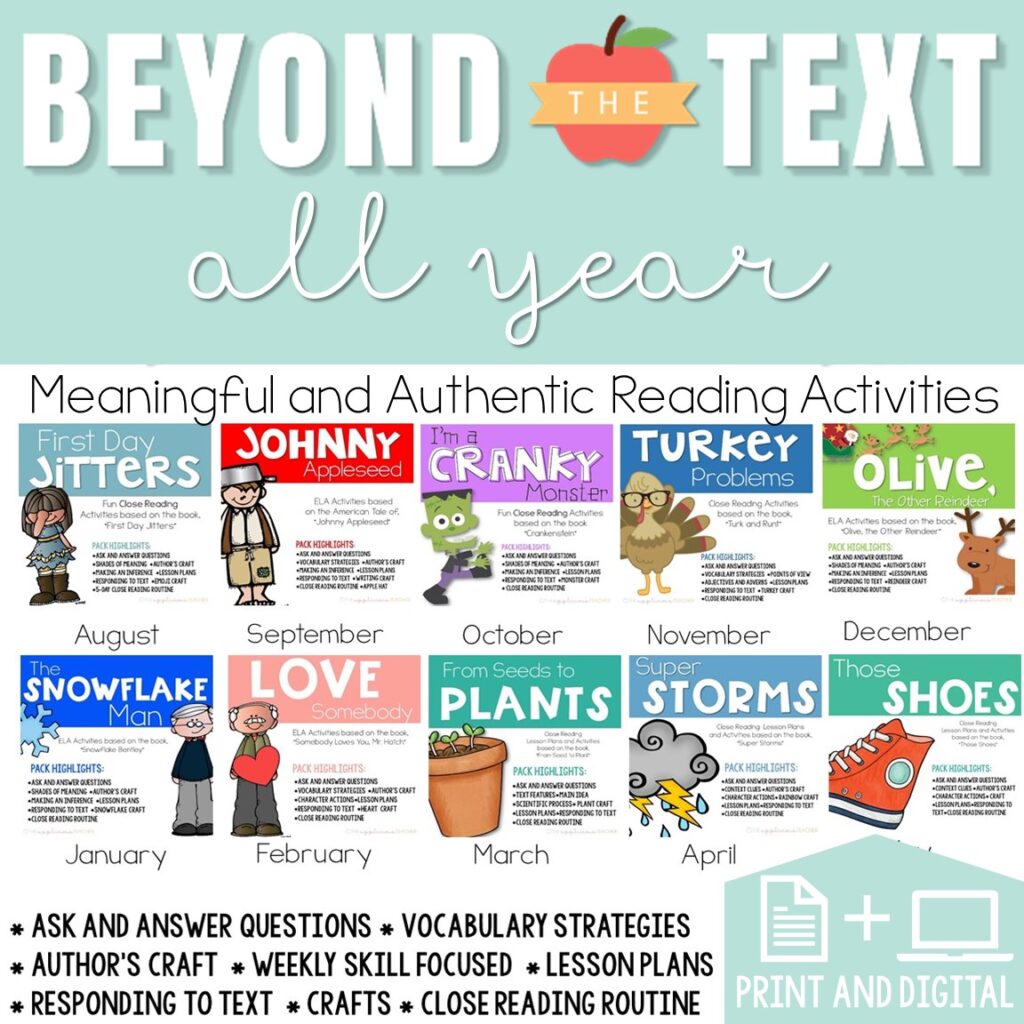
You may also enjoy...

Interactive Anchor Charts: Now Even BETTER!

Color Me Green!

3rd Grade Math Review Jeopardy PowerPoint FREEBIE
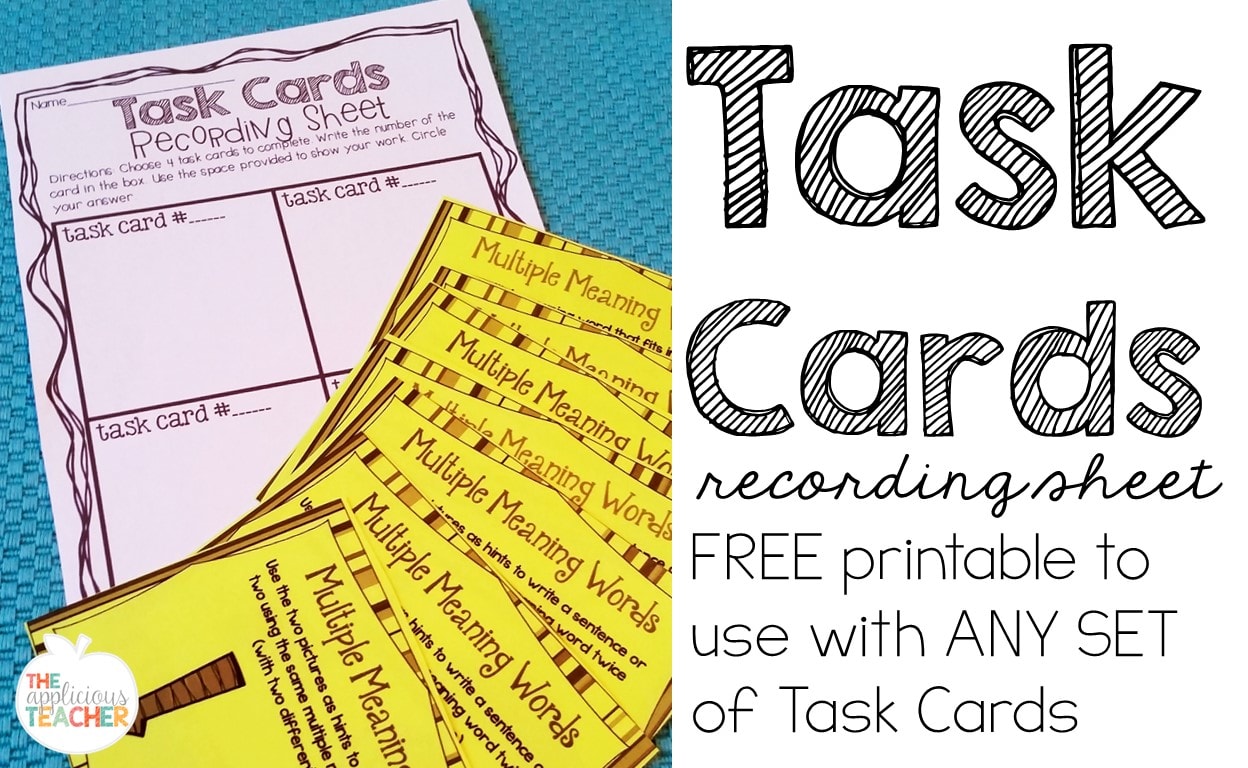
Task Cards Recording Sheet FREEBIE
© 2021 The Applicious Teacher. All Rights Reserved
Designed by Ashley Hughes
Use of Cookies
Privacy overview.
- PRO Courses Guides New Tech Help Pro Expert Videos About wikiHow Pro Upgrade Sign In
- EDIT Edit this Article
- EXPLORE Tech Help Pro About Us Random Article Quizzes Request a New Article Community Dashboard This Or That Game Popular Categories Arts and Entertainment Artwork Books Movies Computers and Electronics Computers Phone Skills Technology Hacks Health Men's Health Mental Health Women's Health Relationships Dating Love Relationship Issues Hobbies and Crafts Crafts Drawing Games Education & Communication Communication Skills Personal Development Studying Personal Care and Style Fashion Hair Care Personal Hygiene Youth Personal Care School Stuff Dating All Categories Arts and Entertainment Finance and Business Home and Garden Relationship Quizzes Cars & Other Vehicles Food and Entertaining Personal Care and Style Sports and Fitness Computers and Electronics Health Pets and Animals Travel Education & Communication Hobbies and Crafts Philosophy and Religion Work World Family Life Holidays and Traditions Relationships Youth
- Browse Articles
- Learn Something New
- Quizzes Hot
- This Or That Game
- Train Your Brain
- Explore More
- Support wikiHow
- About wikiHow
- Log in / Sign up
- School Stuff
- Managing Time During School Years
How to Catch Up on Missed Schoolwork Quickly
Last Updated: April 5, 2024 Approved
This article was co-authored by Alexander Ruiz, M.Ed. . Alexander Ruiz is an Educational Consultant and the Educational Director of Link Educational Institute, a tutoring business based in Claremont, California that provides customizable educational plans, subject and test prep tutoring, and college application consulting. With over a decade and a half of experience in the education industry, Alexander coaches students to increase their self-awareness and emotional intelligence while achieving skills and the goal of achieving skills and higher education. He holds a BA in Psychology from Florida International University and an MA in Education from Georgia Southern University. There are 9 references cited in this article, which can be found at the bottom of the page. wikiHow marks an article as reader-approved once it receives enough positive feedback. In this case, several readers have written to tell us that this article was helpful to them, earning it our reader-approved status. This article has been viewed 118,403 times.
When you miss class, the work can start to pile up quickly. All those assignments and deadlines can be pretty overwhelming, but don’t panic. Talk to your teachers and friends about what you missed. Then, make a plan for tackling your workload, prioritizing the most pressing assignments. Take breaks, reward yourself, and stay positive to boost your productivity. Catching up on missed schoolwork isn’t easy, but with a little organization and strategy, you’ll be better equipped to handle the challenges that come your way.
Talking to Teachers and Friends

- Say something like, “I’m sorry, but I’ll be out of class tomorrow for a family reunion. Please let me know what I need to do to stay on top of my work.”
- You may need to provide a note from a doctor or parent. Check with your school administration to find out.

- Say something like, “I’m so sorry I was out yesterday with the flu. I’m doing my best to get back on schedule. Is there anything important that I missed?”

- You might say, “I’m sorry, I’ve been really busy with soccer lately and I’ve fallen behind on some assignments. I want to do everything I can to catch up. What would you recommend that I do?”

- While talking to students is helpful, it shouldn’t be a substitute for communicating with your teacher. Ideally, you should do both.

- You may be able to meet with your teacher before or after class for extra help.
- Keep in mind that your teacher probably won’t have time to re-explain the entire lecture. Look over all your notes and materials beforehand so you’re as prepared as possible. It may be helpful to come in with a list of questions.
Making a Plan

- Break down big assignments into smaller sub-steps, and nest these under the big assignments on your checklist.
- Don’t forget to check off items when you complete them! It’ll feel super satisfying.

- Put a star next to your top items or highlight them.
- You can color code by priority, underlining the most pressing items in red, the moderately pressing ones in yellow, and the least urgent ones in green.
- If you’re having trouble determining a top priority, ask yourself, “If I only had time to complete one assignment, which one would it be?”

- If you need even more structure, you might schedule your workload by time of day (morning, afternoon, and evening) or even by the hour.
- Input your schedule into a planner or online calendar and refer to it regularly.
- Consider turning a weekend into a “Homework Retreat”. Schedule out an entire weekend to do the assignments you missed. However, don’t overstretch yourself, and make sure to schedule breaks, snacks and other things to keep you energized.

Being Productive

- Say to yourself, “I’ve got this. I’ve caught up on work in the past, and I can do it again.”
- It may help to do something fun before you buckle down, like going for ice cream with friends or taking your dog on a walk.

- You should do something completely unrelated to your work during your breaks. Look at funny memes, take a walk, grab a snack, or chat with a friend. [9] X Research source

- Make sure your rewards are appropriate. Don’t give yourself a huge reward for finishing a relatively small task, and don’t select an insignificant reward for a major task.
- Make your rewards meaningful, specific, and immediate. For example, you might reward yourself with a quick trip to your favorite restaurant for lunch.

- It's fun to laugh and joke with friends, but do your best not to get distracted. Take turns reminding each other to stay focused.

- Teens need around eight to ten hours of sleep each night. For better sleep , try to go to bed around the same time everyday. Staying up late on the weekends can hurt sleep quality. [13] X Research source
- Eat a balanced diet containing lots of fruits and veggies, whole grains, and lean proteins, like chicken. Always eat breakfast, and drink water throughout the day to stay hydrated. [14] X Trustworthy Source HelpGuide Nonprofit organization dedicated to providing free, evidence-based mental health and wellness resources. Go to source

- Do your best to balance your social life, extracurriculars, and schoolwork.
Expert Q&A
- Be honest with your teacher if you think a deadline is unreasonable. They may give you an extension once you explain your situation. Thanks Helpful 0 Not Helpful 0
- If you have a ton of work to finish, it’s easy to get paralyzed. However, remember that it’s always better to work on something than nothing. Thanks Helpful 0 Not Helpful 0
- If this missed work was avoidable, think about ways you can stay on top of your work in the future. Thanks Helpful 0 Not Helpful 0

- Cutting class can be tempting, especially for college students, but it can lead to hours of missed school work and stress down the line. Thanks Helpful 26 Not Helpful 2
You Might Also Like

Expert Interview

Thanks for reading our article! If you'd like to learn more about catching up on school, check out our in-depth interview with Alexander Ruiz, M.Ed. .
- ↑ http://www.students.org/2013/09/25/miss-day-school/
- ↑ https://childdevelopmentinfo.com/learning/tips-help-child-get-back-track-missing-school/#.WXpe4DYqteB
- ↑ http://www.parents.com/kids/education/homework/catch-up-on-homework/
- ↑ http://time.com/2933971/how-to-motivate-yourself-3-steps-backed-by-science/
- ↑ https://www.themuse.com/advice/the-rule-of-52-and-17-its-random-but-it-ups-your-productivity
- ↑ https://hbr.org/2011/05/the-power-of-small-wins
- ↑ https://www.sciencedirect.com/science/article/pii/S1877042814050009
- ↑ https://sleepfoundation.org/sleep-topics/teens-and-sleep
- ↑ https://www.helpguide.org/articles/healthy-eating/healthy-eating.htm
About This Article

If you’re behind on schoolwork and need to catch up quickly, start by creating a chart or checklist of the assignments you need to accomplish including their due dates. Next, use highlighters to color code the assignments by priority by underlining the most pressing items in red, moderately pressing ones in yellow, and the least urgent ones in green. Once you know what needs to be done, create a detailed schedule you can follow. Just don’t forget to give yourself time for a 20-minute break every hour or so. It might seem counter-intuitive, but rest actually increases productivity! For more tips on catching up on missed schoolwork, including how to approach the situation with a positive attitude, read on! Did this summary help you? Yes No
- Send fan mail to authors
Reader Success Stories
Nov 14, 2023
Did this article help you?

Jan 30, 2018
Madison Bynum
Oct 8, 2017
Similo Mabuza
Oct 9, 2017
Thato Thabang
Feb 22, 2017

Featured Articles

Trending Articles

Watch Articles

- Terms of Use
- Privacy Policy
- Do Not Sell or Share My Info
- Not Selling Info
wikiHow Tech Help Pro:
Level up your tech skills and stay ahead of the curve

Why it’s hard for students to “just turn in” missing assignments, and how to get them unstuck
Mar 29, 2023 | Blog

With the end of the semester on the horizon, many students may feel overwhelmed by low grades or feeling behind in some of their classes.
As a parent, it can be stressful to see that your student has overdue work, or get notifications from their teacher that they’re missing assignments.
It’s even more frustrating when you’ve told them over and over again how important it is to “just turn it in”…but the work is still showing up as missing.
The reality is that no matter how simple it might seem to an outside observer, doing missing work is almost never as easy as “just getting it done.” If they haven’t done the work yet, there’s a good chance that something is getting in their way.
If you can figure out what the problem is before jumping in to help them (or make them) do the work, you’ll dramatically increase your chances of success.
In our experience, there are usually 3 main reasons students resist submitting their missing work…even when it seems like “just turning it in” would be SO much easier!
Reason 1: They think it won’t make a difference
Once the due date for an assignment has passed, students often de-prioritize it and move on to focus on upcoming assignments instead. It’s tempting for students to justify this by thinking “there are lots of other assignments, missing one or two won’t matter.”
But what they often don’t realize is that because of the way most grading scales are weighted, even one or two zeros can have an enormous impact on their grade. Showing students the difference it makes to turn in just a few assignments can increase their motivation to get the work done.
Here’s an example of the difference it can make to turn in just a few missing assignments before the end of the semester:
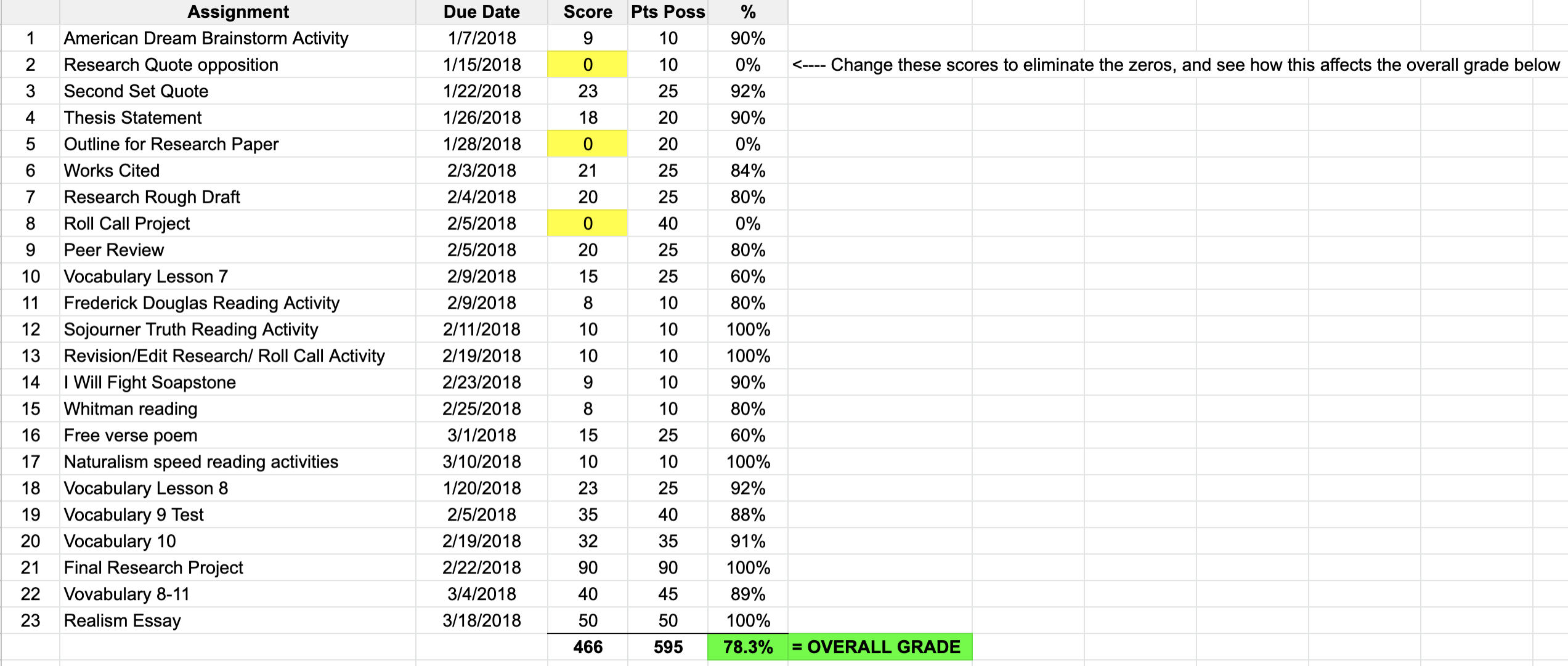
Overall grade with 3 missing assignments: 78.3%
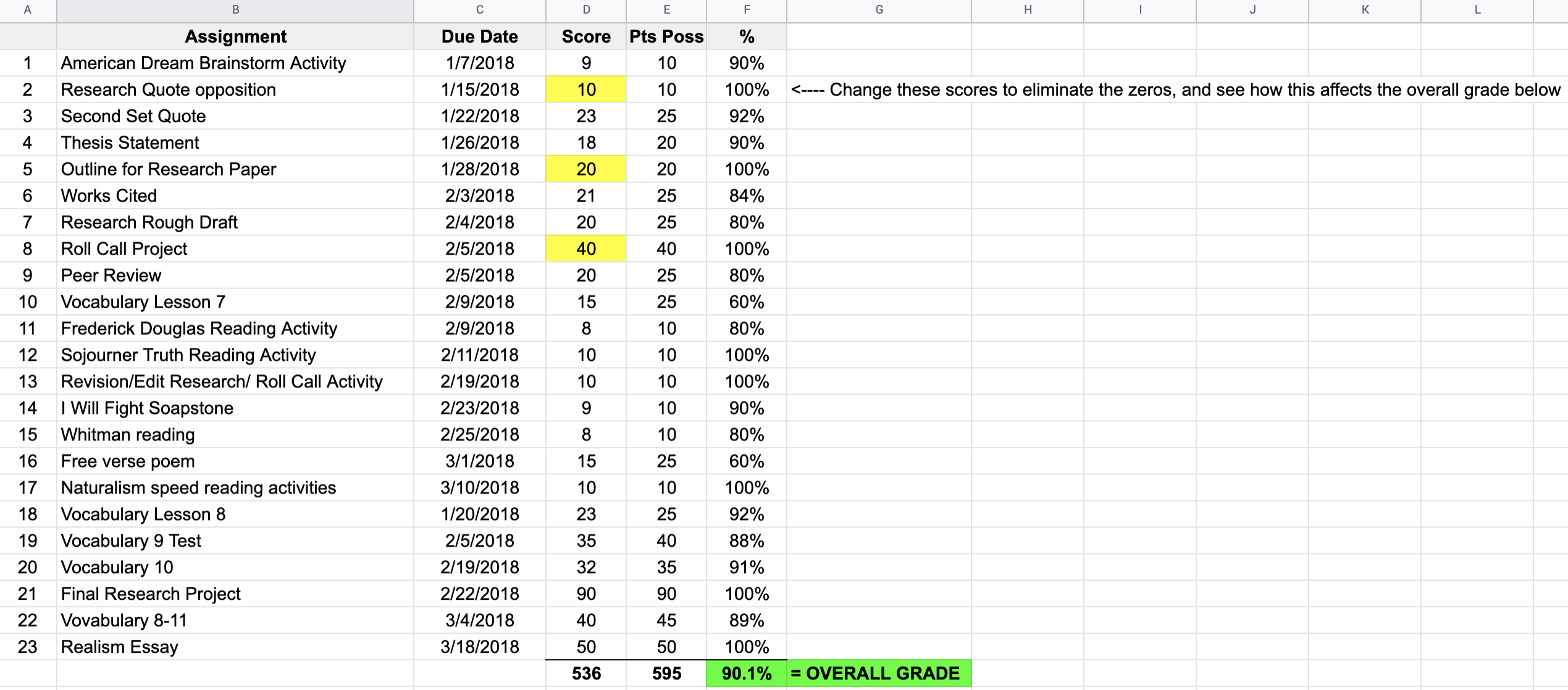
Overall grade when assignments are turned in: 90.1%
It’s hard for students to calculate these averages in their head, so it can be really powerful for them to run the numbers and see firsthand exactly how much they have to gain from making up their missing assignments.
When we do calculations like this with our students, they are almost always surprised by how much this makeup work could improve their grades, and feel much more motivated to submit the assignments when they can see for themselves the difference it will make.
Reason 2: They think it’s too late
Another reason students often resist doing makeup work is that they think it’s too late to get credit for it.
Even if they’ve done the math and know that submitting the work would make a difference in their grade, they still won’t want to turn it in if they think the teacher won’t accept it.
Especially for introverted or anxious students, it can be very intimidating to have conversations with their teachers. They might think they’ll get in trouble for asking to submit their work late, or worry that the teacher will say “no.”
The good news is that many teachers are flexible with their late work policies and allow students to turn in overdue assignments even when it is past the “official” deadline to submit them.
So if students can find the courage to ask for help, there is a good chance that their teachers will respond positively and allow them an opportunity to make up the work.
For students who are struggling to reach out to teachers, we often find it is helpful to roleplay these conversations in coaching sessions if they’re not sure what to say, or work with them to email their teachers if they’re not sure what to say.
Reason 3: They feel overwhelmed
Students who are behind on their work often have challenges keeping track of due dates, managing time, breaking down complex assignments, prioritizing work, staying focused, or following through with plans….which is why they fell behind in the first place.
These challenges can become even more daunting when they are behind in their classes, and trying to complete makeup assignments on top of their normal workload.
This can feel so stressful that a lot of students avoid or put off doing makeup work even when they know how much it would improve their grade.

For these students to get their work submitted, it’s essential to help them find ways to…
- Break down the assignments so they have a realistic plan for getting the work done that they’re confident they can actually follow through with
- Lower the stress they feel while they are doing the work so they will be less tempted to avoid it
- Visualize the progress they are making so they can see that their efforts are making a difference
Providing support
When students have a lot of makeup work to complete, having some additional support to help them work through it can be invaluable.
For some students, this may mean finding a tutor to help them with the content they didn’t understand when their teacher was first presenting the material.
For other students, having a family member or friend nearby as a source of moral support to keep them company while they are working (and a motivating reward to look forward to as soon as the work is completed) can be enormously helpful.
Other students may benefit from working with an academic coach to help them get unstuck and started on their missing work. Sometimes, having someone else who is not a family member step in to help can reduce stress and conflict at home and make it easier for students to take the steps they need to get back on track in their classes. If you think this type of support would be helpful for your student, please feel free to reach out and we’ll be happy to help!

This Tweet probably needs the most explanation. If you remove grade penalties and allow students to turn in ALL their work whenever they want, you will lose every ounce of free time you have. The key is to really identify the assignments that carry the most value. This isn’t to say that the non-essential assignments aren’t valuable, but the non-essential assignments should mean that their function is to allow students to practice specific skills and demonstrate their current level of understanding. They should have more than just that one opportunity to do that for each skill. But…I’m getting ahead of myself.
Part 2: Non-essential Assignments – Multiple Attempts for Learning
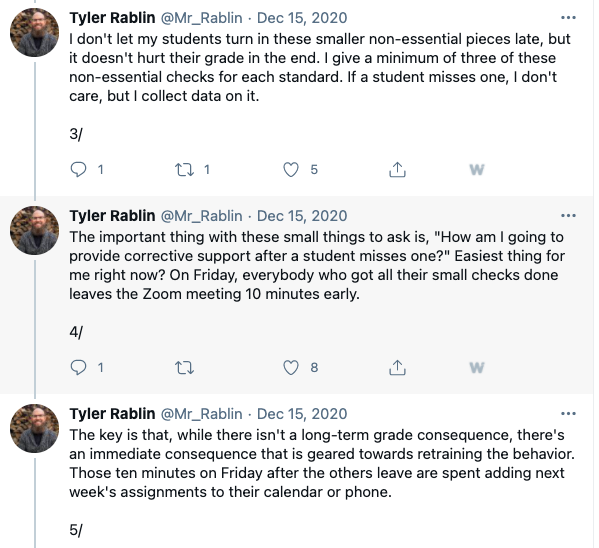
The key with these assignments is that the student will have further opportunities to demonstrate their learning, but these missed assignments demonstrate a need for a different type of support, a support that grade penalties just frankly don’t offer. For your sake, don’t take late work that falls into this category. Tell the student that they missed this opportunity, but they will get another shot at it later. However, if you end there, kids will receive the message that every educator fears: deadlines and completing assignments aren’t important.
This is why there must be a system or process set up to hold students accountable in a way that actually focuses on building those skills. Like I mentioned, my favorite is to have them stay after class and schedule their week with me. I can also put them on my list of students who receive my Remind messages about upcoming assignments. Somehow there has to be a clear next step for students who miss these assignments so that they know (a) you’re paying attention, (b) it’s important, and (c) you want them to get better at self-management and executive functioning.
Part 3: Final Evaluation
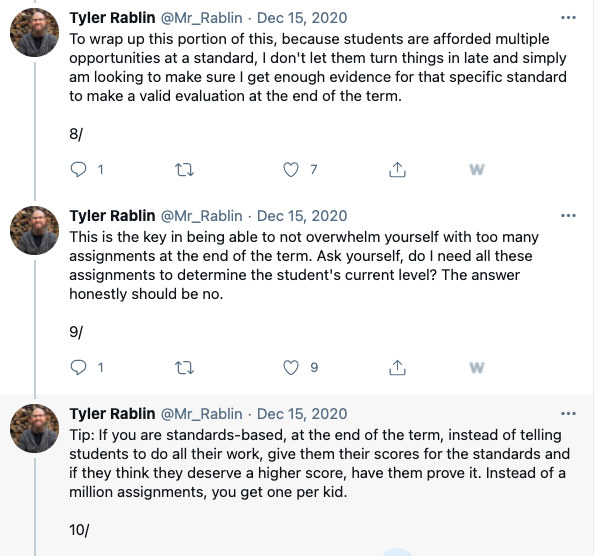
All of this comes down to the fact that we should be averaging scores over time to determine a final score. Not only does that result in an inaccurate report of student learning, but it means that missing assignments will almost inevitably factor into the final grade (unless you drop scores, which I’m always a proponent of).
At the end of a term, the goal is that you are doing a summative evaluation (preferably with the student) where you are looking through their data to determine their final scores. If this step isn’t happening, missing and late work usually ends up being a significant factor in a student’s grade.
Now, I know a lot of people are thinking, “What about the student who doesn’t turn in ANY work?!” At some point, a lack of evidence is a lack of evidence, and that student hasn’t given you enough to demonstrate proficiency in the skill. I have found that this happens WAY less often than we think it does, though.
Part 4: Authentic Consequences for Authentic Assessments
Tweets:
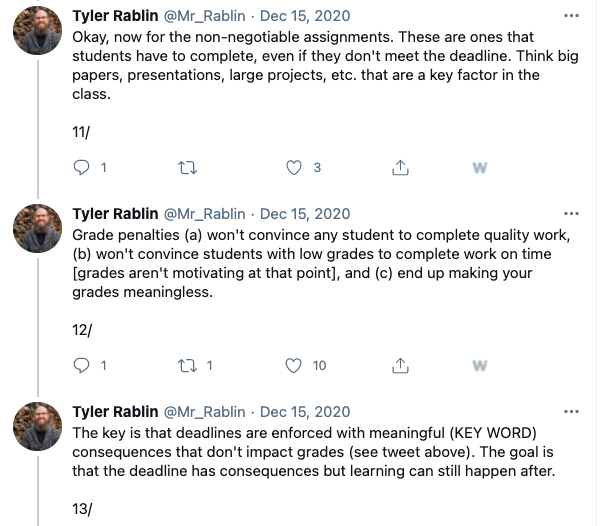
While I probably don’t need to elaborate here, I want to make sure one word shines through: authentic. How are we creating experiences where students get to apply their learning in authentic ways so that the cost of not doing something is actually meaningful for the student? Is this a one-size-fits-all thing? Absolutely not. For a consequence to be meaningful, there must be an element of choice in it. The student has to have had some control and ability to bring in their full self – their passions, interests, goals, etc – to the project. That is when the consequences become powerful.
Part 5: Final Thought

This is why I get so worked up about grade penalties. I know we do them because it feels like we don’t have an alternative, but so often these grade penalties are just kicking a horse who’s already down. These are students who often have already been told they’re bad at school, maybe not explicitly, but the message has been sent over and over. They don’t need another reminder that they can’t do it. We teach them nothing when we add penalties on top of self-doubt. What they need is someone who notices they are struggling, but instead of blaming the student and calling it good, that person goes, “Here’s how we’re going to do better next time. Let’s let this one go and move forward together.”
This is why we have to stop depending on grade penalties. They are a way of washing our hands of the responsibility of educating our kids, of helping them see their best selves. We can do better. It’s not easy, but we can do it, one small change at a time.
Tyler Rablin is a current instructional coach and National Board certified high school language arts teacher in Sunnyside School District in Sunnyside, WA. On the side, he is a consultant with Shifting Schools, contributing writer for Edutopia, and a Google for Education certified trainer. His educational passion is focused on the ways that meaningful technology integration, modernized assessment strategies, and strong cultures of learning can allow us to provide meaningful, powerful, and personal learning experiences for each of our students. In his personal life, he enjoys reading, running, and spending time hiking and camping with his wife and two dogs.

Share this:

Tagged: Grading , late work , standards based grading
What are you thinking? Cancel reply
I love this blog. sign me up..
Email Address:
Give Me More Posts Like This
Join the conversation on Facebook
I Wonder If They Talked About…
Top talking points.
- Advice Poems: A Way to Wrap-Up
- Using Scrum in the Classroom
- Legacy Speeches: Sharing Our Stories
- Creating Magic in the Classroom
- A Happy Little Lesson
- Aim Higher: A Case for Choice Reading and a Whole Lot More in AP English
- Defining Readers-Writers Workshop
- Building Reflection through One-Pagers in AP Lang (and letting kids be kids)
- On Annotations and Assessment in Readers Workshop
- Our Day One Writing: Personal User Manuals
I HOPE THEY TALKED ABOUT…
This slideshow requires JavaScript.
Follow 3TT on Twitter
- Already have a WordPress.com account? Log in now.
- Subscribe Subscribed
- Copy shortlink
- Report this content
- View post in Reader
- Manage subscriptions
- Collapse this bar

A new, streamlined version of Intervention Central is coming in December 2023. The new site will eliminate user login accounts. If you have a login account, be sure to download and save any documents of importance from that account, as they will be erased when the website is revised.
- Academic Interventions
- Behavior Interventions
- CBM/Downloads
How To: Help Students to Complete Missing Work: The Late-Work Teacher-Student Conference
- Self-Management
The reasons that students fall behind in assignments are many. Students who are just developing homework skills , for example, often need more time than peers to complete independent assignments, can find it challenging to focus their attention when working on their own, and may not have efficient study skills (Cooper & Valentine, 2001). To be sure, student procrastination and avoidance in work assignments is a widespread problem. And many students who fall behind in their work also develop a maladaptive, self-reinforcing pattern of escape-maintained behavior: as these students owe ever-increasing amounts of late work, they respond to the anxiety generated by that overhang of overdue assignments by actively avoiding that work. And thus the problem only grows worse (Hawkins & Axelrod, 2008).
When a student begins to slip in the completion and submission of assignments, the teacher can take steps proactively to interrupt this work-avoidant pattern of behavior by meeting with the student to create a plan to catch up with late work. (It is also recommended that the parent attend such a conference, although parent participation is not required.) In this 'late-work' conference, the teacher and student inventory what work is missing, negotiate a plan to complete that overdue work, and perhaps agree on a reasonable penalty for any late work turned in. Teacher, student (and parent, if attending) then sign off on the work plan. The teacher also ensures that the atmosphere at the meeting is supportive, rather than blaming, toward the student. And of course, any work plan hammered out at this meeting should seem attainable to the student.
Below in greater detail are the steps that the teacher and student would follow at a meeting to renegotiate missing work. (NOTE: Teachers can use the Student Late-Work Planning Form: Middle & High School to organize and document these late-work conferences.):
- Inventory All Missing Work. The teacher reviews with the student all late or missing work. The student is given the opportunity to explain why the work has not yet been submitted.
- Negotiate a Plan to Complete Missing Work. The teacher and student create a log with entries for all of the missing assignments. Each entry includes a description of the missing assignment and a due date by which the student pledges to submit that work. This log becomes the student’s work plan. It is important that the submission dates for late assignments be realistic--particularly for students who owe a considerable amount of late work and are also trying to keep caught up with current assignments. A teacher and student may agree, for example, that the student will have two weeks to complete and submit four late writing assignments. NOTE: Review this form as a tool to organize and document the student’s work plan.
- [Optional] Impose a Penalty for Missing Work. The teacher may decide to impose a penalty for the work being submitted late. Examples of possible penalties are a reduction of points (e.g., loss of 10 points per assignment) or the requirement that the student do additional work on the assignment than was required of his or her peers who turned it in on time. If imposed, such penalties would be spelled out at this teacher-student conference. If penalties are given, they should be balanced and fair, permitting the teacher to impose appropriate consequences while allowing the student to still see a path to completing the missing work and passing the course.
- Periodically Check on the Status of the Missing-Work Plan. If the schedule agreed upon by teacher and student to complete and submit all late work exceeds two weeks, the teacher (or other designated school contact, such as a counselor) should meet with the student weekly while the plan is in effect. At these meetings, the teacher checks in with the student to verify that he or she is attaining the plan milestones on time and still expects to meet the submission deadlines agreed upon. If obstacles to emerge, the teacher and student engage in problem-solving to resolve them.
Attachments
- Download This Blog Entry in PDF Format: How To: Help Students to Complete Missing Work: The Late-Work Teacher-Student Conference
- Cooper, H., & Valentine, J. C. (2001). Using research to answer practical questions about homework. Educational Psychologist, 36 (3), 143-153.
- Hawkins, R. O., & Alexrod, M. I. (2008). Increasing the on-task homework behavior of youth with behavior disorders using functional behavioral assessment. Behavior Modification, 32, 840-859.
- Student Data Platform
- - Data Dashboards
- - Data Warehousing
- - Data Integrations
- Advisory Services
- Strategic Decision-Making
- Progress Monitoring
- Family Engagement
- Public Dashboards
- Interactive Demo
- Why Schoolytics
- Resource Hub

Tracking Missing Assignments For Students and Guardians
Published: April 18, 2023
As the end of the school year approaches, students need to get their missing assignments turned in. Not only does this help their overall grade—most class grades depend in part on assignment completion and grades—but completing more assignments helps students’ comprehension as well. Sure, some homework is “busy work”, but certainly not all.
We talk a lot at Schoolytics about how teachers can handle missing assignments , including how to engage parents in their communications around missing work.
But the student and family side is just as important, if not more so. Indeed, teachers only have so much influence over what students do between 3pm and 8am.
Gaps in the student experience in Google Classroom
Students can see their missing assignments in Google Classroom. Helpfully, missing assignments from all classes are listed.
However, the lack of search functionality (“Didn’t I have an assignment about the Pythagorean Theorem that I missed while I was out sick?”) is a real barrier to finding assignments to work on. The inability to sort by anything other than date is too restrictive. This constraint, combined with the groupings for “This week”, “Last week”, and “Earlier”, makes the missing assignments view clunky.
In addition, the “View all” expansion button is easily missed, especially for parents who are not familiar with the interface, leading some students to incorrectly conclude that they have only five missing assignments.
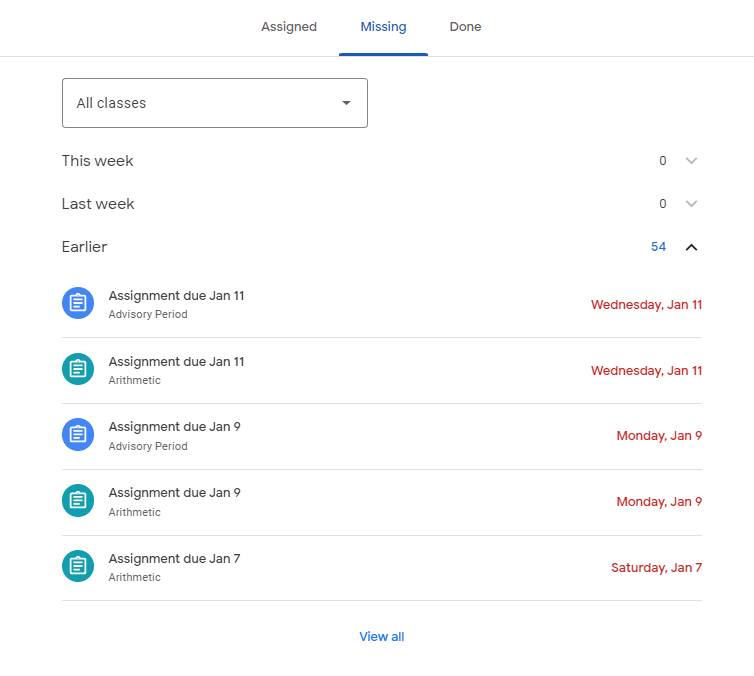
What students really need is support with time management and prioritization skills (all part of executive functioning ). This manifests as understanding how to choose which missing work to tackle first and why. When faced with dozens of missing assignments, where do you start?
Perhaps they want to do assignments that are worth a lot of points. Perhaps they need to ignore assignments due before a specific date because their teacher stopped accepting late work. Unfortunately, these filtering and sorting aids are not available in Google Classroom.
But students can get very granular with missing assignments in Schoolytics . Sorting, filtering, and ranking are all possible.
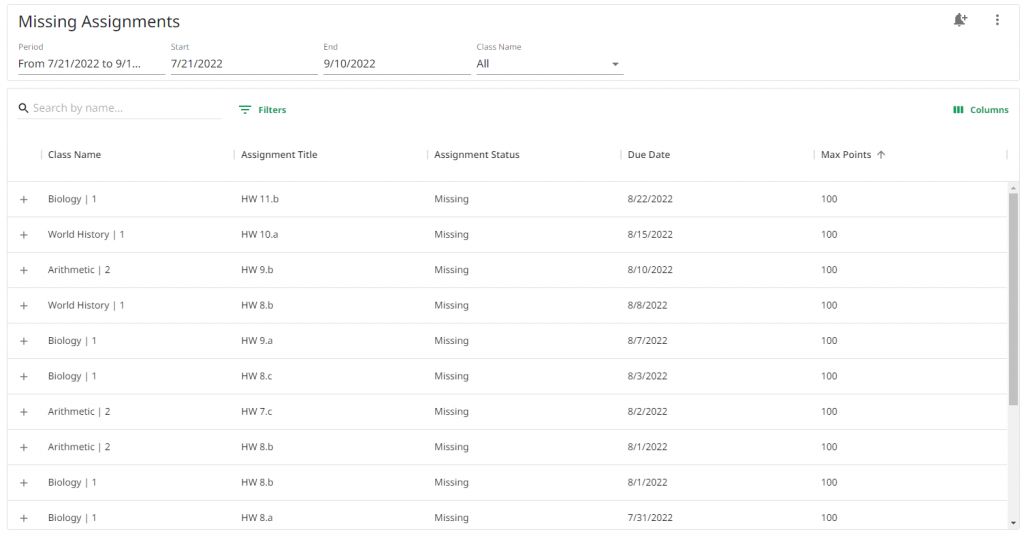
In addition, Schoolytics gives students insights into their aggregate data, so they can see how they’re faring more generally. This also helps them to see more clearly how they are progressing across all of their classes, and prioritize their time accordingly.


Options for Guardians
Because Google Classroom lacks a robust parent experience , guardians have additional challenges in tracking missing assignments for their children. The guardian summaries are somewhat helpful, but are not clickable and only give parents a brief snapshot into what was missed over a period of time. There needs to be a summary of the severity of the problem. Parents tend to ignore them for lack of actionable information.
In Schoolytics, we focus on summarizing and distilling the information down so that guardians can know at a glance whether their child is significantly behind or just has a few things to hand in. And they can see all of their children in one view, thereby saving a lot of time trying to log in and out of Google Classroom accounts. Parents can set alerts, which are similar to summary emails, to keep tabs on missing work.
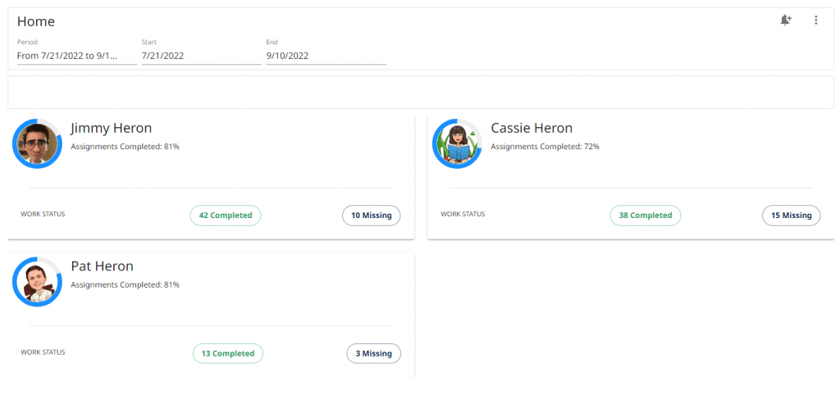
Thousands of parents, guardians, students, and educators use Schoolytics to unlock a deeper understanding of missing assignments. Want to learn more or share Schoolytics with your district? Get in touch with us today!
Related Articles

Why Tableau and Other Traditional BI Tools Are Ineffective for K12 School Districts
Is Tableau Really Worth the Cost? Exploring Cost and Effectiveness of BI Tools for K12 School...

Maintaining Your School's Data Amid Staff Turnover

A Better Way to Handle Missing Assignments

Top 10 Strategies For Catching Up on Missed Schoolwork and Ending The Year Successfully
It’s that time of year when many of the sessions in my private practice involves a discussion with my child or teen clients about strategizing ways to catch up a long list of missed assignments and end the school year successfully.
As a child psychologist and Modern Parenting Expert, I’ve unfortunately seen this scenario play out with many of my clients every year and it breaks my heart. It makes sense that many kids find themselves overwhelmed by late work in the second half of the school year. The first half of the year takes off slowly, allowing the child or teen to ease on in to homework, projects, and the material. Then, Christmas break happens and the child gets used to a slower pace for a while, and then January hits with a BANG!
Teachers mean business after the holidays are over. There is no more easing into the material and work, and the expectations are very high when it comes to producing work. In addition to this less-understanding attitude of the teacher, the academic material naturally becomes more complex and intense too. This scenario oftentimes creates a situation where it becomes very easy for kids and teens of become overwhelmed by the new demands of the second half of the school year.
But I have good news for you: even if your child is SUPER behind in their schoolwork, they can still end the school year on a positive note (and pass all of their classes!) by using the 10 strategies below. These are the same exact strategies that I use with all of my private practice clients, and I’ve seen many families rejoice with relief at the end of the year when their child brings home their well-deserved good grades.
The Strategies
Strategy #1: If you haven’t already, talk to your child’s teacher(s) to get an accurate accounting of the missed assignments and ask for extra time to get these assignments turned in.
For younger kids, the parent definitely needs to take control of this. Kids who are in elementary, middle school, and junior high just don’t have the communication skills necessary to have this important conversation with their teacher(s) and then report accurately back to mom and dad. Do yourself a favor, and take charge of this conversation yourself.
For kids who are in high school, these older kids can be encouraged to have this discussion on their own; however, if your child has a history of procrastination, lying, or academic anxiety, then it is probably better than you get involved in this conversation as well.
The point of this conversation is to get an accurate accounting of what assignments are actually missing. I know that when both my kids were in school, the online grading programs were not always accurate (we used Aries), so talking to the teacher(s) is the only way to ensure that you are getting an accurate idea of the amount of work that needs to be made up.
In addition to discussing which assignments are due, also see if the teacher is on board with your child turning in the assignments late. I’ve found that most teachers (even the grumpy ones) would rather a student turn in their work late than not at all, so most teachers will work with you on a new timeline for missing work.
Strategy #2: Make a realistic weekday AND weekend plan for completing missing assignments.
Now that you know exactly what you child is up against, sit down with them and create a realistic plan for getting it all done. What does realistic mean? It means that both you and your child need to come to terms with the fact that this won’t get fixed overnight. This will take time.
I recommend starting off slow because most kids at this point are so overwhelmed with the idea of making up so much work, that they need to first see that they are capable of tackling this big task. Many parents (and sometimes kids) want to start off by planning that the child or teen will spend all of their free time on homework.
This is just setting your child up for failure.
Look at your list of missing assignments and due dates. Plan to have your child work on 2-4 missing assignments per day on the weekday and more on the weekend (depedning on weekend family activities). Don’t expect your child to complete more that this even if they were able to complete 4 assignments in a half an hour and they have tons of time left in the day. Make a plan and stick to it. The point is to help your child see that they can take a problem, devise a solution, and work consistently on the solution successfully.
Especially with kids and teens who also experience anxiety, this step of the plan helps to manage the anxiety surrounding the missed work. When kids are using all of their cognitive capacity to worry about their academic work, they don’t have much cognitive energy left to actually work on their assignments. By creating a realistic plan, managing the anxiety surrounding the academic stress, and then plugging away every day at the plan, your child or teen will actually be able to work on their assignments more efficiently.
Strategy #3: Go For The Quick Win.
This step is counterintuitive to what most parents instinctively want to do. I’ve seen many parents set their child or teen up for failure when they encourage their child to work on hard assignments first, but this ALWAYS backfires.
For example, let’s say your plan is to have your teenager tackle 3 missing assignments per day and you tell your child to work on a science report that is worth a lot of points as 1 of their assignments for the day. More than likely, this assignment takes a long time to complete because it is really involved. Many kids and teens get discouraged at this point because they don’t see the plan working.
Instead of going for those larger projects first (and I totally understand the reasoning behind why you would want them to start with these projects) start with the “easy wins” first. Choose short assignments, Or assignments in the classes that your child likes or finds easier than other classes.
The point here is to allow your child to experience progress and success. If they see the plan working, then they are more likely to continue with the plan and have a better attitude about working on their missing assignments.
Strategy #4: Create a New Habit Routine – And Don’t Forget The Reward Phase.
Scientific research shows us that creating a “Habit Loop” is the best way of establishing – and keeping – positive behavior patterns. The image below illustrates Charles Duhigg’s Habit Loop. A new behavior needs a reminder (like a particular time of the day) which influences the desired behavior. In order to keep the habit going, the subject must experience some kind of reward after performing the behavior such as some well-earned video game time, the ability to facetime a friend, etc.

Most of the time, I recommend that the reward be something that the child likes to do in their down time.
For more on the Habit Loop, check out THIS ARTICLE on my Parenting The Modern Family blog .
Strategy #5: Take Care of HALTS Before Starting Homework.
It’s hard for anyone to concentrate if they are Hungry, Angry, Lonely, Tired, or Stressed; as such, be sure these common discomforts are addressed. I always recommend that kids should have a snack before starting homework – and research backs me up here. A healthy and quick snack increases their glucose level (the energy needed for your child’s brain to function well), so ensuring they are not hungry goes a long way in helping them get their missing assignments done.
If your child or teen seems angry – or bothered by any other negative emotion – then allow them to deal with that emotion. For example, if your child is angry that they need to do homework instead of play outside with their friends, allow them to talk about their anger and then have a positive discussion with them that they can play with their friend as soon as their homework for the day is finished. If you allow your child to “push down” their emotions, then they’ll just sit there giving cognitive energy to their emotions instead of their homework.
Likewise, if your child is lonely, offer to sit with them while they work – or have the family dog or cat keep them company. If they are tired, re-evaluate their bedtime. Maybe they need to go to bed a half hour earlier. And if they are stressed about their homework, help them decrease their stress levels by using this technique .
As you can see, taking care of your child or teen’s physical and emotional needs goes a long way in meeting the goal of catching up with their missed assignments.
Strategy #6: Consider Pausing Extracurriculars For a While.
If your child or teen has a long list of work that needs to be made up, it might make sense to pause their extracurricular activities. This really isn’t meant to be a punishment per se, but it is a natural consequence of taking care of major responsibilities first. You know your child and the situation regarding their extracurriculars best, so if it makes sense to “pause” their extracurriculars, then go ahead and do so.
Strategy #7: Deal With The Overwhelm.
Dealing with overwhelm is a life skill that most kids haven’t learned yet. Yes – this is a LEARNED SKILL.
It can be very frustrating working with a child or teen who only focus on the goal (getting all the missing assignments completed) and not the small steps in attaining that goal (working on one task at a time). Many young clients sit in my office and focus only on the overwhelming idea of a mountain of work that must be done. When I begin working with them about developing a plan to address their missing work, they shut down and can’t seem to even concentrate on thinking of a plan. They tell me, “That will never work – I have too much to do,” and I have to remind them, “Yes, but you can’t do it all at once. You can only do one task at a time, so which task should you concentrate on first?”.
When your child starts “spiraling” at the thought of so much work that needs to be done, bring them back to reality by reminding them that they can’t do every task right now. Ask them to choose only 1 task to think about (and try to make it a quick win – see strategy #3 above).
Strategy # 8: Get Educational Support For Your Child.
Many kids ignore assignments because they are too difficult for them. Every child has their own unique strengths and weaknesses, which means that most kids won’t be great at every class. If your child is struggling with a particular subject (especially in the last half of the year when the subject matter becomes more complex and difficult) then consider a tutor.
Now, a tutor can mean several things. One type of tutor is someone who has been trained in education and makes a living helping kids overcome their educational struggles. This can be very expensive though. I often ask parents if they have a teenage or college-age person in the family who might be able to come and work with the child for a short period of time. Older kids often like mentoring younger family members. Not only is this a cheaper alternative, but I’ve seen this situation really be effective.
If you need to, get creative with looking for someone to act as a tutor for your child.
Strategy #9: Remember To Take Breaks.
Adults have learned to “power through” things, but kids and most teens still have not developed this life skill yet. Because of this, they will need to take frequent breaks when working on long session of homework. I recommend that kids and teens should take a break every 45 minutes, take a 10-15 minute break, and then get back to work again.
A great technique is the pomodoro method, and this method has some scientific backing that it is very useful. All you have to do is set a timer (there are even tons of pomodoro apps for your phone!) for 45 minutes. When the timer goes off, let your child take a break. They can look at their phones, watch a short Youtube video, go to the bathroom, etc. Set the timer for again for the break time (10 or 15 minutes). When the timer goes off again, that’s the signal that it’s back to work. Set the timer again for 45 minutes and repeat.
You can even challenge your child or teen to work through several pomodoro sessions. This method works well because the timer never lies, and the child learns to take their cues from the sound of the timer.
Strategy #10: Contact a Child Therapist To Help Your Child Work Through Difficult Feelings That Are Holding Them Back From Achieving Their True Potential.
There’s nothing I hate more than seeing kids or teens not living up to their full potential, but this happens a lot when they are also dealing with feelings of anxiety, depression, low self-esteem, or difficulties with concentration (such as ADHD). The only way for your child or teen to move past these feelings that are sidelining them is to deal with them in therapy.
In my private practice, I am passionate about helping kids reach their goals. As a child psychologist and Modern Parenting Expert, I have specific training in helping kids overcome obstacles that are common to this generation of young people. I have helped kids and teens overcome problems with motivation, low self-esteem, anxiety, depression, and many other issues.
Call (909) 326-2562 today to schedule a free 20-minute phone consultation to see if I am a good fit in working with your child. Or click here to use my online scheduler to schedule the phone consultation today.
Your child or teen CAN overcome any obstacle with the right support!
[grwebform url=”https://app.getresponse.com/view_webform_v2.js?u=Sa7o&webforms_id=28316204″ css=”on” center=”off” center_margin=”200″/]

I guess it took remote and hybrid teaching to help me finally get down an effective system.
First, I created a sheet in Google Sheets™ to record the assignments I assigned each day. Each week, I created a new tab and labeled it with the date. I checked off work once it was turned in, changed the box to red if the assignment was missing, and changed the box to blue if the assignment needed a second look.
Now that it was easy for me to see who completed a given assignment, who was missing it, and who needed a second look, I needed a system of communicating that with the students. I also wanted to make sure this information was available to parents.
Using Google Docs™ allowed this information to be easily shared
I created a separate Google Doc™ for each of my students with each of their names, brief instructions, and the list of what they were missing. Using the share button, I changed the permissions so that students, their parents/guardians, and support teachers were able to edit and view the document. This allowed everyone to have up-to-date information regarding students’ outstanding assignments.

So I didn’t have to go back into each missing work page to update as students completed their work, I allowed students editing access. They delete the assignments off their list after they complete them. A few students tried deleting their assignments off the list without completing them. For students who made this a repetitive habit, I changed the settings to comment only which allowed them to inform me what was finished without actually deleting their on-going list.
Initially, it did take a bit to set up each of my students’ pages. However, now that it is done, I can quickly update my students’ pages. I created a bookmark folder on my taskbar called Missing Work. Within that folder, I have each individual page. I just need to click on that folder to access the missing work pages. Compared to handwriting, erasing, searching, forgetting to update, and writing again that happened with my previous systems, Google Doc missing work pages are saving me tons of time.
Why I LOVE this system:
- Students are responsible for checking their missing work page and managing it themselves by deleting what they complete
- Parents have easy access to see if their child is missing work and help support him/her at home
- When I email parents about missing work, it is easy to reattach this page for the information
- Teaching assistants or other staff members can help support my students complete their work, too
- I don’t have to continually rewrite missing work notes
- All the information is in one place—say goodbye to little notes everywhere
- Students just need to click the hyperlink to find their assignments
Let me know if you try this system! I would love to hear about it.
Happy Teaching!
Julie from Llama with Class
Grab some freebies to help you manage students’ missing work with this system
You will need a Google account in order to get these freebies. Click each picture to force a copy to your Google Drive™

Leave a Reply Cancel reply
Your email address will not be published. Required fields are marked *
Save my name, email, and website in this browser for the next time I comment.

The Magic Solution to Missing Assignments
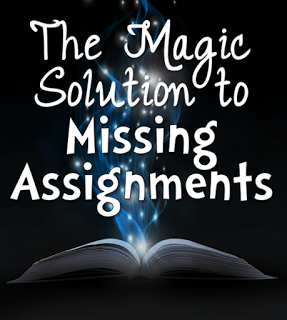
One my biggest struggles as a 5th grade teacher was getting kids to do their homework. I’m guessing you can relate! I was never a fan of loading kids up with homework, but I did expect them to complete whatever was assigned. Most of my homework was finishing classwork, returning a signed paper, or reading for 20 to 30 minutes. Yet precious minutes of class time were wasted every day while kids looked for missing assignments or worse, wasted my time trying to explain why they didn’t have it.
Then I discovered the magic solution to missing homework … Fun Friday! I can’t take credit for the idea, but I can tell you that it works! It was definitely the most effective system I’ve ever used for dealing with the problem of missing assignments.
How Fun Friday Works

Fun Friday is a weekly event that 3 or 4 teachers organize and implement together. On Friday afternoon, each teacher hosts one activity in his or her classroom for 30 minutes. One or two teachers take a group of students out to play or organize indoor recess activities. Another teacher hosts a free time in the classroom where students play board games, draw on the Smartboard, use iPads or play with a class pet. Sometimes a teacher will offer a special arts and crafts activity.
At least one teacher supervises a “study hall.”Students who have not completed all homework for the week attend the Study Hall and use that time to make up missing work. Each week teachers rotate activities so that all share the responsibilities equally.
If there aren’t 3 or 4 teachers at your school who want to participate in Fun Friday, you can implement the program with just two teachers. One will take students outside or provide indoor recess, and the other will split his or her room between a study hall and a quiet reading or game room.
Why Fun Friday Works
My students loved Fun Friday and looked forward to the chance to get together with friends in other classrooms. It was one of the few rewards that actually motivated them to complete every single assignment all week. I kept a homework chart where I checked off those who completed all assignments for the week, and I was pretty strict with my requirements for Fun Friday. If a student even had one missing or late assignment during the week, they went to Study Hall. If you think this is a bit extreme, let me say that after just a few weeks of implementing Fun Friday, most kids would earn it every week. I was amazed at the difference this program made and how much time it saved me from dealing with late and missing assignments.
Fun Friday Sign-up Freebie
One thing that helped make Fun Friday easy to implement was a sign up chart. Right after lunch on Friday, I allowed those who had completed all assignments to sign up for their preference of activities. I’ve created several variations for you to try that you can download here for free .
Convincing Administrators
Over the years I did have a few principals who needed to be convinced that the 30 minutes we devoted to Fun Friday were not wasted. My rationale was that we easily made up this time by not having to deal with missing and late assignments all week. Also, everyone, teachers and students alike, are downright brain-dead by the time Friday afternoon rolls around! Have you ever seriously tried to teach a lesson on a Friday afternoon? Trust me, it’s a wasted effort. You’ll just have to reteach it on Monday!
Do you implement a similar program in your classroom? Have you found it to be effective? If you haven’t tried it, I hope you’ll test it out. I believe you’ll discover the magic of Fun Friday, too!
Candler's Classroom Connections
- Growth Mindset
- Literature Circles
- Cooperative Learning

- Getting to the Core
- Arts/Crafts & Activities
- Hot Tips and Cool Solutions
- Books of the Month
- Care to Share?
- Dishin' up with Diane
- Writing Prompts of the Month
- Diane's Bio
- Favorite Links for Kids
- Favorite Teacher Links
- Advertise with us

Miss Nelson Is Missing Activities
1-2-3 Come Do Some Viola Swamp and Miss Nelson Activities With Me!
“The kids in Room 207 were misbehaving again. Spitballs stuck to the ceiling. Paper planes whizzed through the air. They were the worst-behaved class in the whole school.”

When I read the story to my students, I wore a reversible "cape". (A lovely pastel floral print was on one side, when I became the sweet Miss Nelson . When I "transformed" into the terrible Miss Viola Swamp . ( "...the meanest substitute teacher in the whole world!" ) I easily flipped it to the solid black, ugly side.
I've also donned a plastic witch nose, along with a few long black fingernails for my left hand, while pretending to be Viola . She is the crazy substitute teacher in three children's books by Harry Allard (illustrated by James Marshall). The books are entitled Miss Nelson is Missing!, Miss Nelson is Back, and Miss Nelson Has a Field Day. The latter is by far my personal favorite.
At the start of the story, Miss Nelson’s students are very disrespectful and naughty. They constantly take advantage of her good- natured personality, and haven’t a clue of what a wonderful and sweet teacher they really have, ’til she doesn’t show up one day and is replaced by the horendous substitute, Miss Viola Swamp .
Days pass and FINALLY, to the utter joy of her students, Miss Nelson returns to class with a "little secret" as to her disappearence. By this time, the children have become wonderful and very appreciative students. I highly recommend this great read aloud, and always kept a copy in my sub folder.
Because the book is so popular, I thought teachers would enjoy some activities to go with it. You can do some of them with your students and/or tuck others into your sub folder, to be plugged in as emergency lessons. The Miss Nelson is Missing packet , includes a variety of writing, language arts and reading activites. Plus some adorable "craftivities" to review even more standards.
Here are a few of the FREEBIES.

For added pizzazz, I glued the facial circles to pink and green construction paper and then glued them back-to-back.
The teacher then shows the correct answer and asks students if they know what the word means. If not (s)he defines it.

Children write about what happened to their entire class when their teacher came to school one day, but no one else did!

Completed projects make a wonderful back-to-school bulletin board or hallway display.

This packet will be FREE for an entire year. After which time it will be up-dated & included in my 203-page jumbo Miss Nelson is Missing Literacy & Math packet in my TpT shop. Click on the link to pop on over.
It is one of my most useful & all-time favorite packets. I'm confident that your kiddos will LOVE these activities!

"If you are not willing to learn, no one can help you. If you are determined to learn, no one can stop you." -Dr. Seuss
- miss nelson is missing activities,
- writing activities for back to school
- emergency sub plans
- sub folders
- activities for sub folders
- miss nelson
- miss viola swamp
- Viola Swamp
- venn diagrams,
- Graphic Organizers
- wanted posters
- wanted poster template
- missing posters
- missing poster template
- crafts for miss nelson is missing
- adjective activities
- class made books
- activities for back to school
- Back To School Ideas
- first week of school activities
Related items
- "Pretend You're a School Bus!" Writing Prompt Craftivities
- Activities For Kevin Henkes' Back To School Story, "Wemberly Worried"
- More Mitten Actvities
- We Are Thankful
- Fall Venn Friends
This is absolutely amazing!!!!! I am out for a full week and my students are going to love these activities!
I can't wait to use these with my kiddos! This is going to be so fun and they'll learn at the same time. Can't ask for better than that. Thanks so much for sharing all your hard work! Angie
Oh my goodness I love this SO much!!!!!!!! Thank you thank you thank you!!!!!!!!!!!!!!!!!111
Other Resources

Please help keep my site online and FREE.

If you've enjoyed the teaching materials and would like to donate even a dollar to help me with the cost of running TWM, I'd be grateful. Thank you!
- Alphabet Activities
- Arts and Crafts
- Bulletin Boards
- Certificates & Bookmarks
- Classroom Management
- Common Core State Standards
- Computers-Technology
- Inspirational
- Mustache Mania
- Sign Language
- Social Studies
- Telling Time
- Transportation
- Mission and vision
- Faculty and staff
- Bayesian Analysis of Academic Outcomes from Single Case Experimental Designs
- Catch and Release
- Links to Learning: Adaptive Math Assessment (LLAMA)
- Parents Plus
- Project PEAK
- Lehigh Reach Lab
- Project RISE
- Meet the Team
- Year 1 Activities (2021-2022)
- Year 2 Activities (2022-2023)
- Year 3 Activities (2023-2024)
- Year 4 Activities (2024-2025)
- Project STAY Presentations
- Frequently Asked Questions
- Contact Information
- Sponsored Research Agreement with Renaissance Learning
- Supported College and Career Readiness
- Classroom-wide interventions
Missing assignment tracking
- Organization checklist
- Resources for Parents
- Resources for Mental Health Providers
- Lehigh University Autism Services
What is the intervention? Assignment tracking is an easy to use system that assists students to keep track of their assignments. Students track assignments, due dates and when they are completed.
Who is it for? Students of all ages.
Purpose: This system teaches student’s time and material management skills. This system allows students to track their assignments and also gives them the opportunity to turn in the work in time enough to earn credit.
Materials: Missing Assignment Tracking Reference Guide Missing Assignment Tracking Student Form
- Identify the students who have less than 90% of their work turned in and what assignments they are missing.
- Create a brief introduction to present this system and work with the student to implement the intervention using the steps described in the Missing Assignment Tracking Reference Sheet.
Missing Assignment Tracking Reference Guide Missing Assignment Tracking Student Form
Missing Homework Accountability Slip

What educators are saying
Description.
Are you tired of the never-ending struggle to get students to complete their homework? It's a challenge that teachers face year after year. If you're seeking a practical solution to hold students accountable for missed assignments, then look no further – my Missing Homework Accountability Slip is here to help!
Key Features:
- Effective Accountability: This handy slip is designed to address the issue of incomplete homework head-on. It serves as a powerful tool to ensure that students take responsibility for their actions.
- Simple Implementation: Utilizing the Missing Homework Slip is a breeze. Just print it on brightly colored paper, cut it in half (with 2 forms per page), and place them in a visible bin within your classroom. Whenever a student arrives without their homework, have them complete the form and file it in their personal folder. It's a straightforward process that fosters personal accountability.
- Documentation for Success: These slips are not just pieces of paper; they are essential documentation for parent-teacher conferences. They provide a clear record of a student's missed assignments, facilitating constructive discussions with parents and guardians. More importantly, they serve as a visible reminder to students that they are responsible for their work.
- Proven Results: My Missing Homework Accountability Slip has a track record of success. I developed it years ago to instill accountability in my middle school students, and the positive results were immediate. Students are motivated to complete their homework when faced with the prospect of filling out these forms and explaining to their parents why they didn't complete a simple assignment.
What's Included:
The slip includes fields for the student's name, date, class, and the title of the missed assignment. Students must also check off the reason for not completing the homework, emphasizing personal responsibility. Additionally, there's a space for "Other" reasons, ensuring flexibility.
Empower Your Students:
Transform your classroom by implementing the Missing Homework Accountability Slip. Watch as your students take ownership of their homework and academic responsibilities.
Experience the Difference:
Put an end to missing assignments and promote a culture of accountability in your classroom. Download this resource now and witness the positive impact it can have on your students' homework completion rates!
Check out my Google Forms version of this slip here !
Terms of Use:
This product should only be used by the teacher who purchased it. It should not to be shared with other teachers. Please buy the appropriate number of licenses if this is to be used by more than one teacher.
*Remember: You can receive TPT credits to use on future purchases by leaving feedback on products you buy! Just go to "My Purchases" and click "Leave a Review".
Click here to follow me so you don't miss out on sales and new resources!
Questions & Answers
- We're hiring
- Help & FAQ
- Privacy policy
- Student privacy
- Terms of service
- Tell us what you think
- Real Estate
Missing Assignment Sheet
- Missing Assignment Form
A Missing Assignment Sheet is typically used by teachers to keep track of any assignments that students have not completed or turned in . It helps teachers to identify and address missing assignments, and to communicate with students and parents about their academic progress .
The missing assignment sheet is typically filed by the teacher or instructor.
Q: What is a Missing Assignment Sheet? A: A Missing Assignment Sheet is a document used to keep track of any missing assignments for a student.
Q: Why is a Missing Assignment Sheet useful? A: A Missing Assignment Sheet is useful because it helps students and teachers keep track of any outstanding assignments that have not been turned in.
Q: How does a Missing Assignment Sheet work? A: A Missing Assignment Sheet typically lists the assignment, the date it was due, and a space to mark whether it has been turned in or is still outstanding.
Q: Who uses a Missing Assignment Sheet? A: Teachers and students both use a Missing Assignment Sheet to keep track of missing assignments.
Download Missing Assignment Sheet
Linked topics.
Related Documents
- Violin Lesson Assignment Sheet Template
- Case Assignment Sheet Template - Perez Investigations, Inc. - California
- Pascal's Penguins Missing Number Kids Activity Sheet With Answer Key
- Student Supervisor Weekly Log Sheet and Reflective Assignment
- Convert Word to PDF
- Convert Excel to PDF
- Convert PNG to PDF
- Convert GIF to PDF
- Convert TIFF to PDF
- Convert PowerPoint to PDF
- Convert JPG to PDF
- Convert PDF to JPG
- Convert PDF to PNG
- Convert PDF to GIF
- Convert PDF to TIFF
- Compress PDF
- Rearrange PDF Pages
- Make PDF Searchable
- Privacy Policy
- Terms Of Service
Legal Disclaimer: The information provided on TemplateRoller.com is for general and educational purposes only and is not a substitute for professional advice. All information is provided in good faith, however, we make no representation or warranty of any kind regarding its accuracy, validity, reliability, or completeness. Consult with the appropriate professionals before taking any legal action. TemplateRoller.com will not be liable for loss or damage of any kind incurred as a result of using the information provided on the site.

- Teaching Tips
Dealing With Students Missing Exams and In-Class Graded Assignments
Teachers often become more aware of students’ out-of-class activities than they might wish. Announcements and memos from the dean of students inform about sporting teams and their games and tournaments, forensics, service learning conferences, community-based work, and the like. And teachers quickly become familiar with student lifestyles and illnesses ¾ mono, strep throat, hangovers, the opening of deer and fishing seasons, quilting bees, family vacations, and their family mortality statistics. The relationship between exams and mandatory in-class work and the death of students’ cousins and grandparents is so high it should be a concern of the National Center for Disease Control. Given all this, it is a certainty that students will miss exams and other required activities. What is a teacher to do?
If you want to hear colleagues express frustration, ask them about make-up exams and assignments. Despite knowing intellectually that such absences will occur, teachers hope and pray, even in public institutions, that all of their students will take exams as scheduled. Alas, such prayers are rarely answered, and teachers are faced with the practical issues of keeping track of students who miss exams and assignments, as well as managing make-ups.
All of our advice, except that related to ethics, should be read through the filter of the type of institution where you teach, and the types of courses you teach and how large they are. For example, at a small liberal arts school, where teaching is a faculty member’s primary responsibility, more time may be spent with students who miss exams or assignments, and more creative (time consuming) alternatives may be practical as compared with someone teaching classes of 300 or 500 or more in a Research I institution.
Ethics Teachers are not to cause students harm; we must treat them fairly and equitably, and they must be allowed to maintain their dignity (Keith-Spiegel, Whitley, Balogh, Perkins, & Wittig, 2002). Whatever your procedures are for students who miss exams and required in-class work, they must be equitable, providing students equal chances to earn a good grade by demonstrating equal knowledge. The hard part may be balancing academic rigor and accountability for what students are to learn with a fair and manageable process for those who miss required exams and assignments.
Make-up Exams These should not be more difficult than the original test but must be, as best as you can design, alternate forms of the same exam. Exam banks that accompany texts make designing such alternate forms of multiple-choice tests relatively easy, and colleagues teaching two or more sections of the same course in a semester, who give alternate forms of exams, are often a good source of advice on this matter. Be thoughtful about the following:
- An essay make-up exam may be unethical if regular exams are multiple choice or short answer (or vice versa), since students must study differently and they may be more difficult.
- An oral exam may “punish” students who do not think well on their feet, or are more socially anxious.
- Scheduling make-up exams at inconvenient or undesirable times may express your frustration, but you or someone else will have to be there at the “inconvenient” time also, and such arrangements raise issues of foul play.
- It may be inequitable to students who meet all course requirements to allow their peers to do extra credit or drop their lowest grade instead of making up a missed exam.
In-class Assignments The same considerations exist for students who miss in-class required presentations, or other graded work. If possible, students who were to present should be given opportunities to make up the assignment using the same grading criteria.
Planning Ahead
Spell-out Missed Exam Procedure in Course Policies No matter how well you teach or what inducements or penalties you impose, some students will miss exams and required class activities. Good educational practice argues that you plan for this reality as you design your course, not two days before (or after) your first exam. You want as few surprises as possible once the course begins.
Put your policies in your syllabus. Have a section in your syllabus on exams and other graded work. Specify your policies and procedures if students know in advance they will be absent, or how to notify you if, for whatever reason, they were absent, and any effect, if any, absences will have on their grade.
Keep your policy clear and simple. Before finalizing your syllabus, ask a few students to read your make-up policy to determine if it can be easily understood. If your explanation of what students are to do in the case of missing an exam, and how their grade is affected, is not easily understood, revise it. In developing your policy, do you want students to:
- Notify you if they know they will miss, preferably at least 24 hours in advance, and give you the reason? Talking with you before or after class offers the best opportunity to provide feedback if the reason is questionable, to work out alternatives, and so forth. E-mail also can be useful.
- Notify you as soon as possible after missing an exam or required assignment and give the reason? Again, in person or e-mail work best.
- Present a letter from an authority (e.g., physician) documenting the reason? Keep in mind any student can “forge” such documentation or manipulate it in other ways, e.g., “Fred came to see me complaining of a severe headache.”
- Have their grades lowered if their absence is not “acceptable” (e.g., overslept versus seriously ill)? How will you decide what is acceptable? Our experience suggests that “legitimate” reasons for absence include, but are not limited to: illness of the student or a close relative, accident, court appearance, military duty, broken auto, hazardous weather, and university activities (e.g., athletics, forensics).
Policies should reflect the nature of the exam or graded assignment. If you are teaching an introductory course and each module largely stands alone, it may be appropriate for students to make up a missed exam late in the semester. But if you want students to demonstrate knowledge or competency on an exam or assignment because future course material builds on that which comes earlier, you want to give the students much less time to make up the missed work.
Common policies. A common procedure is for the teacher, teaching assistant, or departmental secretary to distribute and proctor make-up exams during prearranged times (Perlman&McCann, in press). You might also consider allowing students to take make-up exams during exam periods in other courses you are teaching.
Make your policies easy to implement. To maintain your sanity and keep your stress level manageable, you must be able to easily implement your policies. For example, even if you, a secretary, or a graduate student distribute and proctor make-up exams, problems can arise. For example:
- The secretary is ill or on vacation, or you are ill or have a conference to attend. You never want to change the time make-ups are available to students once these are listed in the course syllabus. Have backups available who know where make-up exams are stored, can access them, and can administer and proctor them.
- Too many students for the make-up space. Investigate room sizes and number of rooms available. You may need more than one room if some students have readers because of learning disabilities.
- Students often forget there is a common make-up the last week of the semester. Remind them often and announce this policy on class days when students are taking an exam, as this may be the only time some students who have missed a previous exam come to class.
Encourage appropriate, responsible, mature behaviors. Take the high road and let students know how they “should” behave. For example, one colleague includes this statement in the syllabus:
I expect students to make every effort to take required exams and make course presentations as scheduled. If you know in advance you will miss such a requirement, please notify me. If you are ill or other circumstances cause you to miss a required graded activity, notify me as soon as possible.
One of our colleagues states in her syllabus for a psychology of aging class, “It is very bad form to invent illnesses suffered by grandparents!” By giving students exemplars on how to behave appropriately, you can then thank them for their courtesy and maturity if they follow through, positively reinforcing such behaviors.
God lives in the details. Always err on the side of being “concrete.” If a make-up exam is at the university testing center, tell students where the testing center is. If you or a secretary hold make-up exams in an office, you may want to draw a map on how to get there. It is not uncommon for students to fail to find the office at the time of the exam, and wander around a large university building.
Students Who Miss Exams You have a variety of alternatives available on how to treat students who miss a scheduled exam. Select those that fit your course and the requirements of learning students must demonstrate.
Requiring make-up exams. If you collect all copies of your multiple choice or short answer exams, you may be able to use the same exam for make-ups. Our experience is that it is extremely rare that students deliberately miss an exam to have more time to study, whereas asking peers about specific exam questions more commonly occurs. Your experiences may be different. However, if you put exams on file at the university testing center, and students can take them weeks apart, you may want different forms. If you have concerns, you will need to prepare an equivalent, alternative form of the regular exam, as is often the case for essay tests.
Using procedures other than a make-up exam. Some faculty have students outline all text chapters required for an exam, use daily quiz scores to substitute for a missed exam, use the average of students’ exams to substitute for the one missed, score relevant questions on the comprehensive final to substitute for the missed test, or use a weighted score from the entire comprehensive final substituted for missed exam. Some teachers just drop one test grade without penalty (Buchanan&Rogers, 1990; Sleigh&Ritzer, 2001). Consider whether students will learn what you want from various alternatives and whether this work is equal to what students must demonstrate on exams before adopting such procedures. If your course contains numerous graded assignments of equal difficulty, and if it is equitable for students to choose to ignore a course module by not studying or taking the exam, you should consider this process.
Other teachers build extra credit into the course. They allow all students opportunities to raise their grades, offering a safety net of sorts for those who need to “make-up” a missed exam by doing “additional” assignments such as outlining unassigned chapters in the text.
Scheduling make-ups. Pick one or two times a week that are convenient for you, a department secretary, or teaching assistant, and schedule your make-ups then. Some faculty use a common time midway through the semester and at the end of the semester as an alternative.
Students Who Miss Other In-Class Assignments Allowing students to demonstrate learning on non-exam graded assignments can be tricky. Such assignments often measure different kinds of learning than exams: the ability to work in groups, critical thinking as demonstrated in a poster, or an oral presentation graded in part on professional use of language. But you do have some alternatives.
Keeping the required assignment the same. If the assignment is a large one and due near the end of the semester, consider using an “incomplete” grade for students who miss it. Alternatively, students can present their oral work or poster in another course you are teaching if the content is relevant and time allows it. The oral required assignment also can be delivered just to the teacher or videotaped or turned in on audiotape.
Alternative assignments. As with missed exams, you can weigh other assignments disproportionately to substitute for in-class graded work — by doubling a similar assignment if you have more than one during the semester, for example. The dilemma, of course, is not allowing students easy avenues to avoid a required module or assignment without penalty. For example, oral assignments can be turned in as written work, although this may negate some of the reasons for the assignment.
When we asked colleagues about alternatives for missed in-class graded assignments (as compared with exams), almost everyone cautioned against listing them in the course syllabus. They felt that students could then weigh the make-up assignment versus the original and choose the one that gave them the greatest chance of doing well, and also the least amount of anxiety (in-class presentations often make students nervous). They recommended simply telling students that arrangements would be made for those missing in-class required graded work on a case-by-case basis.
Students Who Miss the “Make-Up” On occasion, students will miss a scheduled make-up. Say something about this event in your syllabus, emphasizing the student’s responsibility to notify the instructor. We recommend that instructors reserve the right to lower a student’s grade by “x” number of points, or “x” letter grades. If you place exams at a university testing center, you may not find out the work has not been made up until the course is over, leaving you little choice but to give the student an “F” on that exam or assignment.
When the Whole Class Misses a Required Exam or Assignment On rare, but very memorable, occasions the entire class may miss an exam or assignment. For example, both authors have had the fire alarm go off during an exam. After a bomb threat cleared the building during his exam, the campus police actually contacted one author to identify whether a person caught on camera at a service station was a student calling in the bomb scare. (It was not.) The other author experienced the bomb squad closing a classroom building during finals week due to the discovery of old, potentially explosive, laboratory chemicals. Of course, the blizzard of the century or a flood might occur the night before your exam. What is a teacher to do?
The exam or graded assignment must be delayed. Prepare beforehand. Always build a make-up policy into your syllabus for the last exam or student presentation in a course. Talk with your department chair or dean about college or university policy. State that if weather or other circumstances force a make-up, it will occur at a certain time and place. This forethought is especially important if you teach at a northern institution where bad winter weather is not unusual. For exams and assignments during the semester, the policy that works best is to reschedule them (again, stating this in your syllabus) for the next regular class period. Call attention to this policy early in the semester, and post it on your course Web site. The last thing you want to do is call or e-mail everyone in the class to tell them an exam has been cancelled.
An exam or graded assignment is interrupted. Graded assignments such as oral presentations are easily handled. If time allows, continue after the interruption; if not, continue the next class period or during your designated “make-up” time.
If something interrupts an exam, ask students to leave their exams and answers on their desks or hand them in to you, take all personal materials, and leave immediately. A teacher can easily collect everything left in most classes in a few moments. Leave materials on desks if the class is large, or be the first person back to the room after the interruption. Fire alarms, bomb scares, and the like usually cause a lot of hubbub. Only if you have a lengthy two- or three-hour class, with time to allow students to collect themselves and refocus, and no concern about their comparing answers to questions during the delay, should the exam be continued that same day or evening.
If the interruption occurs late in the class period, you might tell students to turn in their work as they leave. You can then determine how you want to grade exams or the assignment, using pro-rated points or percentages, and assign grades accordingly.
If the interruption is earlier in the hour, the exam will have to be delayed, usually until the next class period. With a multiple-choice exam, we advise giving students the full (next) class period to finish their exams. If you are concerned about students comparing questions they have already answered, you will have to quickly develop an alternate exam.
A teacher’s decisions are more complicated if the exam is short answer or essay. Students may have skimmed all essay or short answer questions before an interruption. Will they prepare for those questions before the next class period? What if some students only read the first essay question but do not know the others they must answer? Preparing an alternate exam may be feasible, but students need to know you will do so, so they do not concentrate their studying on specific topics you will not ask about.
We know that such class interruptions are rare, but they can wreak havoc with students and teachers, be stressful, and raise issues of fairness that echo throughout the rest of the course. We advise teachers to talk with colleagues, and we have found a department brown bag on the topic fascinating. Your colleagues may have some creative and sound advice.
Summary A teacher needs to plan ahead. Take some time to think about what it means for you and students who miss required in-class work. A little preparation can save a lot of time and hassle later in the semester. Students deserve and will appreciate policies that are equitable and manageable.
Author’s Note: The authors are interested how teachers deal with missed or interrupted graded in-class work (and their horror stories). Contact us with your ideas and experiences at [email protected] .
References and Recommended Reading
- Buchanan, R. W., & Rogers, M. (1990). Innovative assessment in large classes. College Teaching, 38 , 69-74.
- Carper, S. W. (1995). Make-up exams: What’s a professor to do? Journal of Chemical Education, 72 , 883.
- Davis, B. G. (1993). Tools for teaching . San Francisco: Jossey-Bass.
- Keith-Spiegel, P., Whitley, B.G. E. Jr., Balogh, D. W., Perkins, D. V., & Wittig, A. F. (2002). The ethics of teaching: A casebook (2nd ed.). Mahwah, NJ: Erlbaum.
- McKeachie, W. J. (2001). Teaching tips: Strategies, research, and theory for college and university teachers (11th ed.) Boston: Houghton Mifflin.
- Nilson, L. B. (2003). Teaching at its best: A research-based resource for college instructors (2nd ed). Bolton, MA: Anker.
- Perlman, B., & McCann, L. I. (in press). Teacher evaluations of make-up exam procedures. Psychology Learning and Teaching, 3 (2).
- Sleigh, M. J., & Ritzer, D. R. (2001). Encouraging student attendance. APS Observer, 14 (9), pp. 19-20, 32.
Do you know of any research related to taking points off an exam for students who take a make-up for whatever reason? It is mentioned in this article but I’m interested in evidence to back up that it is fair and/or punitive in a college setting with adult learners. Thank you. Gerri Russell, MS, RN
I teach introductory nutrition and other biology classes. If a student can prove that they missed an exam or assignment for a verifiable reason, even if they let me know ahead of time (usually technology related reasons), I let them make it up without taking points off. If they can’t prove it I take off points as follows: 10% off per day late during the first week after the assignment is due. Half credit earned after that. Even if they know there are always students who just miss things for no apparent good reason. I feel like this is fair because it gives them the responsibility for making it up, and I’d rather people become familiar with the material, rather than just not do it at all.
I think that the mid semester tests must be abolished from all colleges/universities in order to let them prepare for the final exams without any pressure of getting grades,this will not give rise to any decompetition then,so I personally feel that my suggestion will be very useful I want everyone to obey that
APS regularly opens certain online articles for discussion on our website. Effective February 2021, you must be a logged-in APS member to post comments. By posting a comment, you agree to our Community Guidelines and the display of your profile information, including your name and affiliation. Any opinions, findings, conclusions, or recommendations present in article comments are those of the writers and do not necessarily reflect the views of APS or the article’s author. For more information, please see our Community Guidelines .
Please login with your APS account to comment.
About the Author
BARON PERLMAN is editor of "Teaching Tips." A professor in the department of psychology, distinguished teacher, and University and Rosebush Professor at the University of Wisconsin Oshkosh in the department of psychology, he has taught psychology for 29 years. He continues to work to master the art and craft of teaching. LEE I. MCCANN is co-editor of "Teaching Tips." A professor in the department of psychology and a University and Rosebush Professor at the University of Wisconsin Oshkosh, he has taught psychology for 38 years. He has presented numerous workshops on teaching and psychology curricula, his current research interests.

Student Notebook: Five Tips for Working with Teaching Assistants in Online Classes
Sarah C. Turner suggests it’s best to follow the golden rule: Treat your TA’s time as you would your own.
Teaching Current Directions in Psychological Science
Aimed at integrating cutting-edge psychological science into the classroom, Teaching Current Directions in Psychological Science offers advice and how-to guidance about teaching a particular area of research or topic in psychological science that has been
European Psychology Learning and Teaching Conference
The School of Education of the Paris Lodron University of Salzburg is hosting the next European Psychology Learning and Teaching (EUROPLAT) Conference on September 18–20, 2017 in Salzburg, Austria. The main theme of the conference
Privacy Overview

FREE Missing Assignments Note

umm so do u doall of my missing assignments
California Civil Code areas 945 and 945.5, characterize how such assignments happen, and different rules demonstrate the "first on schedule, first in right" guideline. how to write a reflection paper
Online channels have revamped the methodology in education where aspirants can access knowledge from any part of the globe. To have effective access to this facility it is important to have a professional portal like Management assignment help. Best Assignment Help UK
Managing missing assignments in the elementary classroom requires effective strategies. While tools like the Free Missing Assignment Note can aid in tracking incomplete work, it's crucial to address the root causes. Teachers can provide support and guidance to students, ensuring they understand the importance of completing assignments on time. However, when it comes to academic tasks at higher levels, seeking assistance from a reliable management essay writing service can be a helpful option for students to excel in their studies while learning essential management skills.
Hi! I'm so happy you decided to stop by Teacher's Take-Out! You will find some fun resources to "take out" and bring back to the classroom. I am always adding new updates and information so check back later. Take a look around. You might just find something to take out. Welcome to my classroom!
Don't Miss a Post
Popular posts.

My FREEBIES
My products.
- My Clip Art
My ClipArt Pins
Delivering....
- Literature/Informational Text
- Addition and Subtraction
- Multiplication and Division
- Measurement & Data
- Geometry/Measurement
- Place Value
- Problem Solving
- Kindergarten Resources
- 1st Grade Resources
- 2nd Grade Resources
- 3rd Grade Resources
- 4th Grade Resources
- 5th Grade Resources
- Fall and Halloween
- Spring Resources
- Winter Resources
Mini Reports Bundle
Super bundle, fact families.
- Kindergarten Chaos End Of Year Slide Show For Your Little Learners 1 day ago
- Classroom Freebies End of Year Handout and Gift Tag 2 days ago
- Simply Kinder End of the Year Theme Days in Kindergarten 2 days ago
- This Reading Mama Long u Vowel Team Mapping Cards 3 days ago
- Step into 2nd Grade 3 Exciting End of the Year Activities and Books 3 days ago
- The Nerdy Teacher What Role Does AI Play In My Life As A Teacher? #AIedu #EdChat 3 days ago

- Teaching With a Mountain View Using Picture Books to Build Self-Awareness 5 days ago

- It's All Primary I’m Done Now What – Early Finishers Choice Board 1 week ago
- STEMHAX Peanut’s Bedtime Adventures 1 week ago
- Teaching Made Practical Distinguishing Fact and Opinion – Examples for Lesson Plans 2 weeks ago
- Little Minds at Work April Adventures Await Kindergarten Explorers: Snag 25 FREE Downloads! 3 weeks ago
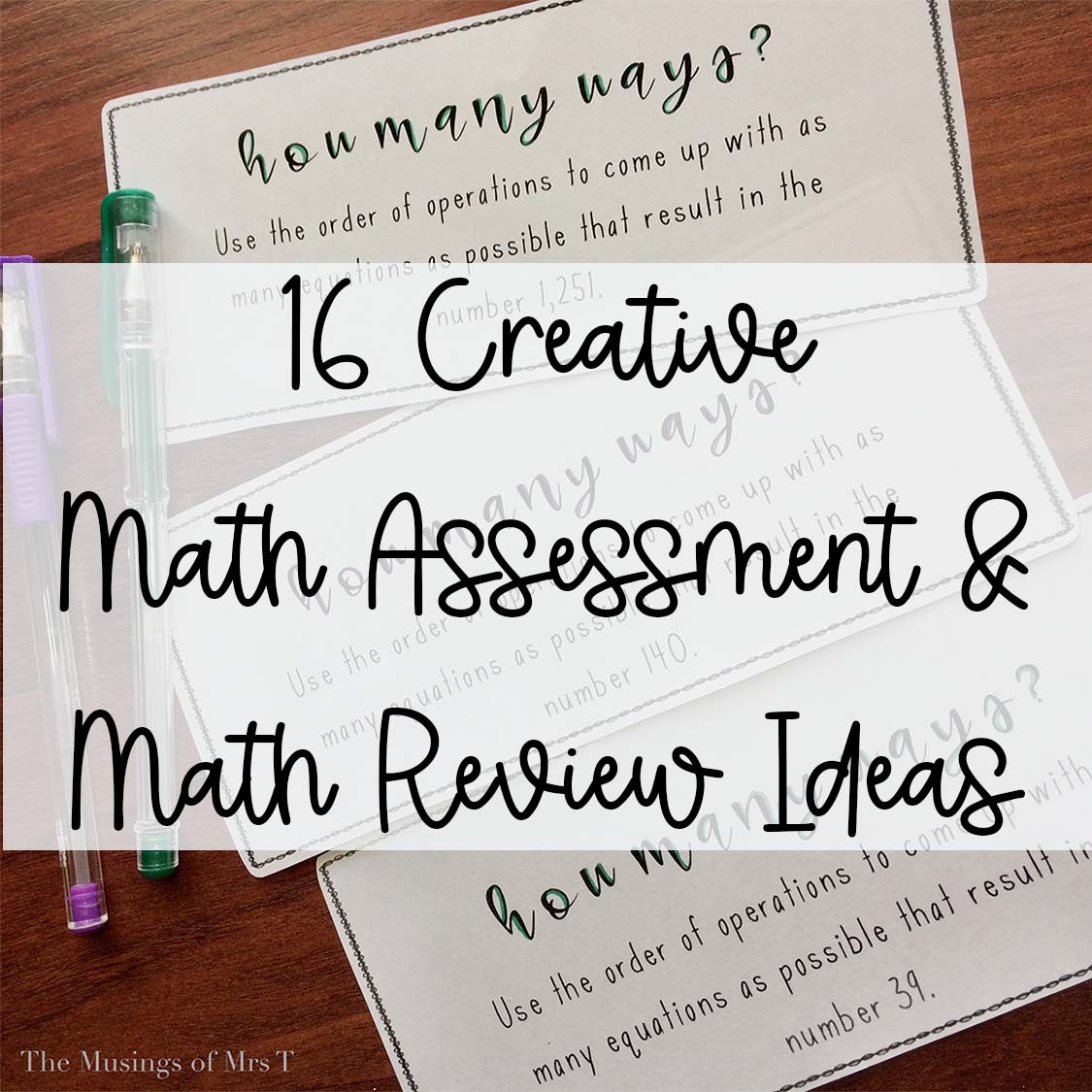
- Think Tank Teacher Learn to Create Escape Rooms, Scavenger Hunts and Classroom Games to Sell or Use in Your Classroom 5 weeks ago
- Minds in Bloom Making Your Own Connections Game: A Fun Classroom Innovation 3 months ago
- The CheekyCherubs How to Leave TPT Feedback & Earn Store Credit 3 months ago
- Teach Junkie Valentines Day Themed Class Book Freebie – Love Is… 3 months ago
- Reading and Writing Redhead 4 Games to Hack for Phonics and Phonemic Awareness Practice 3 months ago

- Teaching with Nancy Spreading Holiday Cheer: Teacher Tips for Promoting Positive Behavior in Young Children Before Christmas 5 months ago

- Swahili Magic Fascinating Terms Used for Different Insects in Swahili 6 months ago

- A Teachable Teacher High Frequency Words and Heart Words Flashcards 8 months ago

- Terri's Teaching Treasures Top 5 Professional Development Books for Math Teachers 9 months ago

- Vocabulicious 5 Powerful Ways to Use a Worksheet on Character Traits 1 year ago

- TiePlay Educational Resources LLC Hello again! 1 year ago

- kindermomma.com First Day of Kindergarten Activities, Hints, and Freebies 1 year ago

- The Elementary Professor The Gaping Hole in Multiplication Practice & Activities for Every Multiplication Table 2-12! 2 years ago
- Chalk Dust and Dreams Looking in the Rearview Mirror… 2 years ago

- Learning is Messy ”The product isn’t as important as the process.” (Or – “Getting to a final product is an important part of the process.”) 2 years ago

- First Grade Friendly Froggies Beautiful day for a walk! 3 years ago

- Funky in Fourth A Beginner’s Guide to Math Talks 3 years ago
- Teacher In Exile See You Next Year! 3 years ago

- Christi Fultz Personalized Children’s Books from In The Book 3 years ago

- Pen and Paper Phonics Online Learning: An Essential Guide for Learners 3 years ago

- Darbyshire's Crew Teaching Resources 3 Way Conferences – An Authentic Discussion 4 years ago
- Teachers Thriving Why wellness centres for teachers are not the solution 4 years ago

- Tech With Jen 3 Ways to Use Summer to Prep for Next Year 4 years ago
- FlapJack Free Editable St. Patrick’s Day Worksheet (Secret Picture Tile Style) 5 years ago

- Early Sparks | Teacher-Created Resources
Footer Social Icons
© 2019 Teacher's Take-Out . Felicity Template by Georgia Lou Studios designed by Website + Branding Design by Christi Fultz . All rights reserved.
- Forums Home
- AutoCAD Community
- AutoCAD Forum
Missing “Plot style table (pen assignments) problem
- Subscribe to RSS Feed
- Mark Topic as New
- Mark Topic as Read
- Float this Topic for Current User
- Printer Friendly Page
- Back to Topic Listing
- Mark as New

Forums Links
- Getting started
- Contact Support & Downloads
- Autodesk Education Support
- Trial Support
Can't find what you're looking for? Ask the community or share your knowledge.
Post to forums


You're signed out
Sign in to ask questions, follow content, and engage with the Community
- Canvas Question Forum
Missing Assignment
- Subscribe to RSS Feed
- Mark Topic as New
- Mark Topic as Read
- Float this Topic for Current User
- Printer Friendly Page
- Mark as New
- Report Inappropriate Content
Solved! Go to Solution.

View solution in original post
- All forum topics
- Previous Topic
Ensuring Exam Quiz Security: Your Input Needed!
Editing imported course content, canvas link submission, can you lock the course_format field, setting missing gradescope assignments to zero on ..., help with edit assignment dates, community help, view our top guides and resources:.
To participate in the Instructurer Community, you need to sign up or log in:
- Entertainment
- Share full article
For more audio journalism and storytelling, download New York Times Audio , a new iOS app available for news subscribers.

- May 10, 2024 • 27:42 Stormy Daniels Takes the Stand
- May 9, 2024 • 34:42 One Strongman, One Billion Voters, and the Future of India
- May 8, 2024 • 28:28 A Plan to Remake the Middle East
- May 7, 2024 • 27:43 How Changing Ocean Temperatures Could Upend Life on Earth
- May 6, 2024 • 29:23 R.F.K. Jr.’s Battle to Get on the Ballot
- May 3, 2024 • 25:33 The Protesters and the President
- May 2, 2024 • 29:13 Biden Loosens Up on Weed
- May 1, 2024 • 35:16 The New Abortion Fight Before the Supreme Court
- April 30, 2024 • 27:40 The Secret Push That Could Ban TikTok
- April 29, 2024 • 47:53 Trump 2.0: What a Second Trump Presidency Would Bring
- April 26, 2024 • 21:50 Harvey Weinstein Conviction Thrown Out
- April 25, 2024 • 40:33 The Crackdown on Student Protesters
Stormy Daniels Takes the Stand
The porn star testified for eight hours at donald trump’s hush-money trial. this is how it went..
Hosted by Michael Barbaro
Featuring Jonah E. Bromwich
Produced by Olivia Natt and Michael Simon Johnson
Edited by Lexie Diao
With Paige Cowett
Original music by Will Reid and Marion Lozano
Engineered by Alyssa Moxley
Listen and follow The Daily Apple Podcasts | Spotify | Amazon Music | YouTube
This episode contains descriptions of an alleged sexual liaison.
What happened when Stormy Daniels took the stand for eight hours in the first criminal trial of former President Donald J. Trump?
Jonah Bromwich, one of the lead reporters covering the trial for The Times, was in the room.
On today’s episode

Jonah E. Bromwich , who covers criminal justice in New York for The New York Times.

Background reading
In a second day of cross-examination, Stormy Daniels resisted the implication she had tried to shake down Donald J. Trump by selling her story of a sexual liaison.
Here are six takeaways from Ms. Daniels’s earlier testimony.
There are a lot of ways to listen to The Daily. Here’s how.
We aim to make transcripts available the next workday after an episode’s publication. You can find them at the top of the page.
The Daily is made by Rachel Quester, Lynsea Garrison, Clare Toeniskoetter, Paige Cowett, Michael Simon Johnson, Brad Fisher, Chris Wood, Jessica Cheung, Stella Tan, Alexandra Leigh Young, Lisa Chow, Eric Krupke, Marc Georges, Luke Vander Ploeg, M.J. Davis Lin, Dan Powell, Sydney Harper, Mike Benoist, Liz O. Baylen, Asthaa Chaturvedi, Rachelle Bonja, Diana Nguyen, Marion Lozano, Corey Schreppel, Rob Szypko, Elisheba Ittoop, Mooj Zadie, Patricia Willens, Rowan Niemisto, Jody Becker, Rikki Novetsky, John Ketchum, Nina Feldman, Will Reid, Carlos Prieto, Ben Calhoun, Susan Lee, Lexie Diao, Mary Wilson, Alex Stern, Dan Farrell, Sophia Lanman, Shannon Lin, Diane Wong, Devon Taylor, Alyssa Moxley, Summer Thomad, Olivia Natt, Daniel Ramirez and Brendan Klinkenberg.
Our theme music is by Jim Brunberg and Ben Landsverk of Wonderly. Special thanks to Sam Dolnick, Paula Szuchman, Lisa Tobin, Larissa Anderson, Julia Simon, Sofia Milan, Mahima Chablani, Elizabeth Davis-Moorer, Jeffrey Miranda, Renan Borelli, Maddy Masiello, Isabella Anderson and Nina Lassam.
Jonah E. Bromwich covers criminal justice in New York, with a focus on the Manhattan district attorney’s office and state criminal courts in Manhattan. More about Jonah E. Bromwich
Advertisement

IMAGES
VIDEO
COMMENTS
Today, I'm sharing this simple yet HIGHLY effective routine that basically eliminated the struggle to get students to complete missing or incomplete assignments. This magical weekly routine that solves the missing work problem is fondly called, " Catch-up and Pickles. " But, that's really just a fancy name for a time set aside on a ...
Check with your school administration to find out. 2. Communicate with your teacher after unexpected absences. Stay after class to talk with your teacher one-on-one, or head to their office during your free time. Explain the situation, let them know you're trying your best to catch up, and ask what you missed.
Here's an example of the difference it can make to turn in just a few missing assignments before the end of the semester: Overall grade with 3 missing assignments: 78.3%. Overall grade when assignments are turned in: 90.1%.
Part 1: Organizing Assignments into Essential vs. Non-essential. Tweets: This Tweet probably needs the most explanation. If you remove grade penalties and allow students to turn in ALL their work whenever they want, you will lose every ounce of free time you have. The key is to really identify the assignments that carry the most value.
Teacher PD. Search by typing & pressing enter. YOUR CART. Track Missing Work with the Homework Slip. Teaching middle school, students are in and out of your classroom all day. You see each student for maybe 50 minutes. Maximizing instruction time is key.
2. Get parents, families, and caregivers on board to help keep students on track. One of the best ways to keep students from getting too far behind is to recruit the champions they have outside school. When parents and guardians are kept in the loop about the assignments that are upcoming—along with expectations and due dates—they can help ...
Negotiate a Plan to Complete Missing Work. The teacher and student create a log with entries for all of the missing assignments. Each entry includes a description of the missing assignment and a due date by which the student pledges to submit that work. This log becomes the student's work plan.
Tracking Missing Assignments For Students and Guardians. As the end of the school year approaches, students need to get their missing assignments turned in. Not only does this help their overall grade—most class grades depend in part on assignment completion and grades—but completing more assignments helps students' comprehension as well.
Plan to have your child work on 2-4 missing assignments per day on the weekday and more on the weekend (depedning on weekend family activities). Don't expect your child to complete more that this even if they were able to complete 4 assignments in a half an hour and they have tons of time left in the day. Make a plan and stick to it.
First, I created a sheet in Google Sheets™ to record the assignments I assigned each day. Each week, I created a new tab and labeled it with the date. I checked off work once it was turned in, changed the box to red if the assignment was missing, and changed the box to blue if the assignment needed a second look.
Sketchbook Assignment 13, Due Friday 1/6. Sketch 1: Find a face in a magazine. Cut it out, cut it in half and glue the half into your sketchbook. Now draw and shade the missing half of the face. Sketch 2: Find another interesting picture in a magazine, cut it out and glue it in to your sketchbook.
Sometimes a teacher will offer a special arts and crafts activity. At least one teacher supervises a "study hall."Students who have not completed all homework for the week attend the Study Hall and use that time to make up missing work. Each week teachers rotate activities so that all share the responsibilities equally.
The Miss Nelson is Missingpacket, includes a variety of writing, language arts and reading activites. Plus some adorable "craftivities" to review even more standards. Here are a few of the FREEBIES. There are 76 word cards, plus a blank set to program with your own. Great for vocabulary building.
Missing Assignment Tracking Student Form. Steps: Identify the students who have less than 90% of their work turned in and what assignments they are missing. Create a brief introduction to present this system and work with the student to implement the intervention using the steps described in the Missing Assignment Tracking Reference Sheet.
Simple Implementation: Utilizing the Missing Homework Slip is a breeze. Just print it on brightly colored paper, cut it in half (with 2 forms per page), and place them in a visible bin within your classroom. Whenever a student arrives without their homework, have them complete the form and file it in their personal folder.
A Missing Assignment Sheet is typically used by teachers to keep track of any assignments that students have not completed or turned in.It helps teachers to identify and address missing assignments, and to communicate with students and parents about their academic progress.. The missing assignment sheet is typically filed by the teacher or instructor.
The oral required assignment also can be delivered just to the teacher or videotaped or turned in on audiotape. Alternative assignments. As with missed exams, you can weigh other assignments disproportionately to substitute for in-class graded work — by doubling a similar assignment if you have more than one during the semester, for example.
Depends on the assignment. If it's a project that weighs 15% of your grade, then missing it's going to make it harder (but not impossible) to pass your class. If it's homework that weighs 10% of your total grade, and you get like 100 assignments per semester, then you'll be fine. You have the syllabus. You tell us.
Place the plot style in the same location as the drawing that is loaded. Try setting the support path to a directory on the local drive to rule out issues accessing files on the network or Dropbox location. To Convert from CTB to STB: Convert the drawing to a color-dependent or named-plot style drawing depending on the type of the missing plot ...
Managing missing assignments in the elementary classroom requires effective strategies. While tools like the Free Missing Assignment Note can aid in tracking incomplete work, it's crucial to address the root causes. Teachers can provide support and guidance to students, ensuring they understand the importance of completing assignments on time.
Hi, >> when I created a new DWG, when I tried to plot, on the "plot" window. >> in the "Plot style table" I can see only the stb files. This depends which template you used to create a new drawing file ... the ones with filename " *Plot Styles.dwt " use STB, the other ones use CTB. For existing drawings you can use command CONVERTPSTYLES ...
Sometimes we mark an assignment as missing or a student doesn't turn in an assignment by the due date and it automatically gets labeled as missing. That's good. But, when we grade a missing assignment that was submitted, the missing distinction doesn't automatically go away. We're having to go in and fix these one by one.
Find GIFs with the latest and newest hashtags! Search, discover and share your favorite Missing-assignments GIFs. The best GIFs are on GIPHY.
This episode contains descriptions of an alleged sexual liaison. What happened when Stormy Daniels took the stand for eight hours in the first criminal trial of former President Donald J. Trump?